#it's not the same approach to an understandable villain as black panther but it is a good one for a different message
Text
More Black Panther: Wakanda Forever Shit with spoilers (Because this has officially consumed me). Part 1 of my thoughts are here and now let’s get into Namor. Because a lot of Namor’s actions, were out defense, or an action of an outside force.
I have a vague idea that Namor was some sort of anti-hero in the Marvel Comics, but I didn’t know much else about him. But Ryan Coogler has so far made antagonists in the MCU more...sympathetic. Or at least someone that has a point. I mean it was because of Killmonger that T’Challa decided to open Wakanda to the rest of the world. A villain ended up influencing a hero’s decision by the end of the movie.
But besides that, Ryan Coogler’s framing of Namor is really brilliant because Namor’s actions are out of defense and/or are justified.
When Namor returns to the surface to bury his mother in her homeland, only to find it desecrated, people that look like him enslaved and beaten, and the slave masters calling him demon, he responds by burning everything up there to the ground and preparing for the day of a possible invasion from those same people.
When T’Challa reveals Wakanda to the rest of the world, causing other countries to scramble and try to find Wakanda under the sea, Namor responds by killing everyone that attempts and tries. It might seem cruel, but if a single person on that vessel at the beginning of the movie, made it out and said that there are blue people in the water, his kingdom would have been discovered, and his people would be in danger. He has no choice but to make sure that there are no witnesses.
T’Challa’s actions are also why Namor decides to approach Ramonda and Shuri after the attack. He’s probably thinking: even if it was an accident, Wakanda put my people in danger. You can help rectify that mistake by bringing me the scientist who helped with creating a machine to find vibranium, so that I may kill them and keep my people safe.
Then Shuri decides to go to Talokan willingly, and Namor responds by showing her the kingdom, and even explaining his backstory, and why he is doing what he is doing. Shuri’s actions are ones that show Namor that she is willing to understand. She wants to find a peaceful way. She wants to know why. Namor even states that he was blinded by hope when addressing his people about Shuri’s escape. He saw Shuri’s actions and responded with hope.
And even though the attack on Wakanda was devastating, and the loss of Ramonda has caused a pathway of anger and revenge for Shuri, it was a valid response from Namor. Think about it this way: Ramonda tricked Namor. Ramonda took Namor away from Talokan so Nakia could break Shuri and Riri out of prison, resulting in the death of two of his subjects. Who as far as we know, were innocent, especially since one of them responded in horror to Nakia when she killed one of their own. Even if Namor was aware that Shuri didn’t want this to happen and was under the assumption that Shuri had no part to play, her mother created a plan that compromised his people and got two innocent people killed. So he responds by invading Wakanda and taking Ramonda’s life. Her death was repayment for the lives that her plan had taken.
And when we get to the part where Shuri is completely ready to end Namor, she chooses mercy. She tells him to yield and they will create and alliance. Namor responds by yielding to Shuri. He knows for a fact that Shuri has not forgiven him for his actions. He knows that it’s because she feels empathy for his people, and that Wakanda has no allies. The world wants their resources. The only people Wakanda can trust, is a kingdom that is exactly like them.
So again, many of Namor’s actions were acts of defense to what was going on around him, and he was thinking of the benefit and safety of his people. I am really happy that Namor is alive by the end of this, because he is a really compelling character. Can’t wait to see him further in the MCU. Also, Tenoch Huerta did a phenomenal job as Namor.
(So tomorrow, I’m going to talk about the ancestral plane scene and You-know-who if you’ve seen the movie already).
#black panther#bpwf#bpwf spoilers#black panther wakanda forever#black panther spoilers#black panther wakanda forever spoilers#wakanda forever#wakanda forever spoilers#namor#shuri#queen ramonda#t'challa#killmonger#wakanda#talokan#nakia#ryan coogler
49 notes
·
View notes
Text
also (w359 spoilers ahead), marcus cutter is a stand-out villain bcos like, u kno that writing advice that goes 'everyone feels justified in their actions so u have to make a Justification for your villain doing evil', but ppl keep doing those villains wrong (i have Thoughts on why but that's another post)
cutter, like, we understand his motivations. we know he was wronged in his youth! we can see some sympathy there! and we can see his goal is what he genuinely thinks of as a Better Humanity.
and yet we are not pulled into 'well he's right he's just Using The Wrong Methods'. we can also see how what he believes is wrong, even tho he's twisted it around to think it's right. we can see where a lot of his goals are mostly about making things better for himself, even as he pushes a line of 'for progress! moving forward!' along with those self-interested goals. and, vitally, he's not up against heroes who are trying to ~keep the status quo~ or w/e, or go sadly 'well because of your Methods we cannot accept your Very Good Goal'
he's a very good example of a villain with a reason, a plausible reason, an at times sympathetic reason, but with whom we do not side, and who also gets to be campy and evil and fun.
#w359blogging#i think one of the major failings of ppl taking the 'give villains a justification' advice and doing it wrong#is that they assume 'justified' means 'sympathetic' but like. VERY sympathetic.#unfortunately if a villain is TOO sympathetic we the audience... stop liking the heroes#ppl don't necessarily... like to feel conflicted abt good vs evil in media. this is why sometimes Just Evil Villains succeed so well#bcos the 'give villains a justification' thing is about adding realism to your writing#but sometimes audiences don't want realism. they want to feel GOOD when the villain is taken down.#(not all the time. some ppl like the conflict. but also some media is so damn bad at doing a Properly Conflicted Thing#like? black panther? did great on 'good motive bad methods' bcos the good motive was CONTINUED by the good guys#other media... says 'good motive bad methods' and dismisses the motive entirely bcos of the methods#no one can ever take up that cause again without being tarred by the same brush (is the message of the story)#and that's uhhhhhh rly shitty writing and also NOT a good way to feel conflicted abt the heroes & villains for the audience#bcos either they must hate the villain's good motivation or they have to like. question the heroes. .......anyway.)#this is all to say! cutter's a fantastic balance between 'understandable motivations' and 'just genuinely evil u can root for him to fail'#like you UNDERSTAND him but you don't AGREE with him. he's got the realism without that ethical quandary.#it's not the same approach to an understandable villain as black panther but it is a good one for a different message#....................i said these thoughts were another post. they are instead tags. sorry about that.
14 notes
·
View notes
Text
Falcon and the Winter Soldier: Ep. 4 Takeaway
Uh. No. No, I was not in any way, shape, or form prepared for that heart-wrenching opening. That raw emotion. The gut-punching fear. The devastation. The soul massive relief from under all that fear and pain. No, I was not ready.
“She’s just a kid.” This is why Sam should be Captain America. Look, no one can replace Steve Rogers. There will never be another Steve Rogers. But that’s not the point. Sam isn’t meant to replace anyone. He’s meant to be his own Captain America. A man who has the heart and soul of a person who doesn’t go looking for a fight. A man who will fight when it needs to be done. A man who reaches out with compassion first and fists second. Sam is the Captain America this world needs in these modern times and tbh it doesn’t deserve him.
“Those are our friends you’re talking about.” “The Avengers, not the Nazis.” Thank you for your contribution, Bucky. 😂 No, but, I really liked the our friends. Not just my friends, but our friends and Bucky concurring with that by pointing out who Sam means.
Sam sharing the story about his TT. His family means so much to him as does community and I think that’s why he can relate to Karli and what she wants to do but also cannot condone how she’s going about it.
Yes, if anyone wondered, Baron Zemo would sell out his family to the White Witch for some Turkish Delight.
I do like Zemo stepping back into the more villainous role. While I enjoyed the humor from last episode, it never really sat right with me that they gave Zemo a “tragic” backstory. He was Hydra in the comics and it feels weird to me to change it in such a way. He was a supremacist so his new anti-supremacist ideals is...off-putting to me.
“It wasn’t just one community coming together. It was the entire world.” Hence why Sam can understand Karli’s goals.
Sam assuming the leadership role so much in the episode. So much foreshadowing to what’s (hopefully) to come.
When Bucky loses it with Zemo and Sam is like “Don’t engage. He’s just gonna extort you and do that stupid head tilt thing.” Not only is this more leadership from Sam it’s also showing how much he pays attention. He knows all their social cues. He knew Zemo was gonna do that probably before Zemo even did. In other words, Sam Wilson is remarkable.
Sam calling Sharon for help. I wasn’t expecting her again so soon. Yay!!
As soon as John Walker steps on screen I want to punch something.
“He’s dealt with worth. And he’s not my partner.” Look at Bucky backing Sam up while trying to play it cool. We all know you love him, Buck.
Sam talking to Karli. Coming to her from a place of understanding and genuinely trying to earn her trust because he does understand her pain. He’s filled with so much compassion and so much empathy and he knows how to employ both of them to better a situation and the world at large instead of coming in guns blazing. He gets it. And he wants Karli to know that he gets it. His approach to getting her to see that she’s going about it in the wrong way. But while she’s okay with acceptable loss, she in fact expects it, Sam is not. “No, it’s not a better place if you’re killing people. It’s just different.” Again, this is what makes him a good Captain America.
“He knows what he’s doing.” Bucky’s faith and trust in Sam when Walker is literally itching for a fight. That...cold, obsessed look in Walker’s eyes was chilling. (I’ve given kudos to Mackie and Seb for their acting but I should also acknowledge Wyatt Russel’s chilling performance))
Thank you, John Walker, for coming in and making things better oh wait, no. Just come in a fuck things up. Super of you.
Sam’s immediate “no” when Zemo asked if he’d take the serum if he was offered it and asking about Bucky being included in the “super soldiers cannot be allowed to exist.” “Blood isn’t always the solution.” Sam is just. I’m running out of words.
I’m now walking a thin line of patience with Bucky criticizing Sam over not taking the Shield. Like, yes, he’s right in that Steve’s wishes were not honored, but Sam is living the consequences wanting to do the right thing by giving the Shield to a museum. He did not and would not have ever handed it over to anyone to use, especially not a man like John Walker. Sam didn’t give it to him. The government did. The same way they’d’ve given the serum to a man like Gilmore Hodge. The same way they forced it upon Isiah Bradley and then experimented on him and locked him away. The same way they “agreed” that Sam was doing the right thing by turning the Shield over and then handing it to John Walker. This is not Sam’s fault.
I could take hours of Ayo and the Dora Milaje kicking John Walker’s ass.
Ayo and the Dora Milaje.
Did I mention Ayo and the Dora Milaje?
I really want to know what Ayo said to Bucky there**. After everything the Wakandans did for him, I can understand why she did what she did. She helped give his freedom and his mind back to him. I know Bucky only intercepted in that particular fight because Sam asked him to and he didn’t (not totally) want them to hurt Walker but. They gave him this place of freedom and his actions (breaking Zemo out, getting involved in their fight) did disrespect them.
The Dora stepping on and catching the Shield. SWOON.
“They weren’t even super soldiers.” Oh, boo freaking hoo. You don’t need the serum to be a superhero, dude. And the fact that you’re basing so much of this on that plus your obesssion to gt it just proves you’re not worthy of it.
“Power just makes a person more of themselves, right?” Vs. “Because a strong man, who has known power all his life, will lose respect for that power. But a weak man knows the value of strength, and knows compassion."
Seriously, the expressions John Walker makes sends chills down my spine.
Karli calling Sarah. I actually thought she’d show up in person. Sarah’s comments about “Captain America” and her assurances that Sam is not working for Walker.
Sam’s immediate protectiveness when Sarah calls him and Bucky’s worry on his behalf. Sam’s anger with Karli when they meet again and the fact that he didn’t argue with Bucky for him wanting to come rather than Sam going in alone.
Sam and Bucky working together (anyone notice a lot less bickering??) is so amazing. I love them as a team.
Sam’s face when he realizes that Walker took the serum.
Quite honestly, if Bucky Barnes wanted to stab me with knives all night long, I’d let him.
Not happy with them killing Lemar for white man pain. I’m sure there were other ways they could have had Walker rage out.
That amazing parallel between Steve slamming the Shield down in Civil War to defend himself and Bucky and Walker killing a person who was just with Karli.
Speaking of parallels, there was SO many in this episode. The serum vials being shattered. The bursting through the doors Shield first. The jumping out of the window with the Shield. Just wow.
“The Whole World is Watching”. A quote from Black Panther when T’Challa did not kill Klaue, an actual terrorist. The title of this episode when John Walker kills a man who didn’t even incite his rage.
And, of course, that final image. I’m still shaking over it. If there’s a better image for what America represents to the rest of the world, idk what is. I just want to cry after seeing what this man is doing with it. This is why he’s U.S. Agent who represents the “power” and “strength” and “might” of the United States. Not Captain America who represents the ideals and hopes of what any country can be.
The acting in this is utterly incredible. The story has me reeling. My mind has been blown by each and every episode and I can’t believe there are only two left.
**Edit: Got it now! Thanks to those who messaged/replied!!
#Sam Wilson#Bucky Barnes#John Walker#Falcon and the winter soldier#Lemar Hoskins#Baron Zemo#marvel#Sharon Carter#mcu shows#fws spoilers#mcu#long post#my stuff#thoughts
103 notes
·
View notes
Text
Dignified Don
Like we said before in one of our articles that the 1970s was the most chaotic decade for Marvel Comics but at the same time, it witnessed a creative explosion which was unique, diverse and even risky for that era
The only decade that was creatively more explosive than it was the decade that preceded it (when Stan Lee, Jack Kirby & Steve Ditko led the charge)
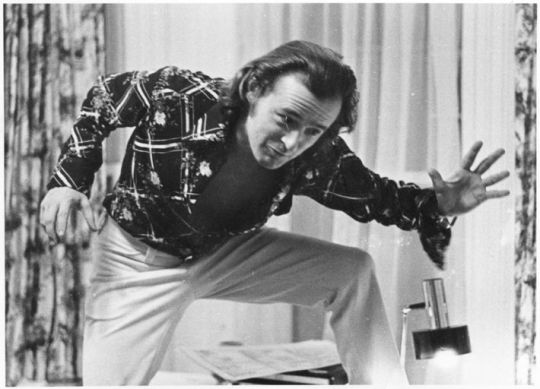
One of the unsung heroes of the 70s is Don McGregor and while he worked on titles such as Power-Man (Luke Cage), Morbius the Living Vampire, The Deadly Hands of Kung Fu; his MOST notable works happen to be Jungle Action featuring The Black Panther and Killraven

Buy Marvel Legends Retro Collection Black Panther Action Figure
What makes Don McGregor’s Jungle Action run critically acclaimed? Well he believed in the character of Black Panther for starters and it was that belief that led to him changing the narrative of the comic itself. From being a storyline pushing Kipling’s “White Man’s Burden” for Africa; he decided to make this comic center around Black Panther and Wakanda’s narrative or POV
Much of the characters we see today on the silver-screen that are part of Wakanda-verse came as a result of McGregor’s Jungle Action run. If Erik Killmonger is your favorite then thank Don and Rich Buckler for creating it

Art by Rich Buckler (Jungle Action no. 8)
Today’s generation might find it weird but Don is the one who made way for interracial kissing in comics. Yes, before him it wasn’t conceivable despite the fact that Marvel had led the industry by introducing an African superhero (Black Panther) as well as an African American superhero (The Falcon) in 60s. In case of Jungle Action, it was between Taku and Venomm
His run wouldn’t have garnered so much praise had it not been for the artists who worked with him to visualize his stories. Two most notable names: Rich Buckler and Billy Graham
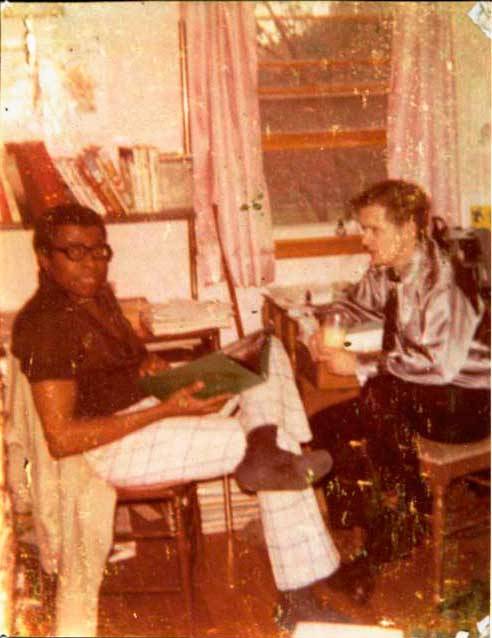
Billy Graham (left)
Don’s approach towards Black Panther, Wakanda and its main characters was so well thought out that it won praise from all segments of comic book readership, the critics as well as peers. He won Bill Finger Award for Excellence in Comic Book Writing, his Panther’s Rage story is considered Marvel’s first graphic novel by critic Jason Sacks while the late Dwayne McDuffie went on to say:
“This overlooked and underrated classic is arguably the most tightly written multi-part superhero epic ever. ...It's damn-near flawless, every issue, every scene, a functional, necessary part of the whole. Okay, now go back and read any individual issue. You'll find seamlessly integrated words and pictures; clearly introduced characters and situations; a concise (sometimes even transparent) recap; beautifully developed character relationships; at least one cool new villain; a stunning action set piece to test our hero's skills and resolve; and a story that is always moving forward towards a definite and satisfying conclusion. That's what we should all be delivering, every single month. Don [McGregor] and company did it in only 17-story pages per issue.” - Dwayne McDuffie
In 1989, Don would team-up with legendary artist Gene Colan for Panther’s Quest and two years later he and Dwayne Turner would work on Black Panther limited series entitled: Panther’s Prey which would mark an end to McGregor’s run on the character. He would continue his work by writing for Morbius, Spider-Man and Blade till the late 90s
End Note
The real story always remains buried under facts. In case of Don, his story is about a white male taking the task of writing stories about ethnic characters at a time when race relations are sensitive to say the least. What we learn from his story is that as long as we have a better understanding about our surroundings and even our world which includes people from other backgrounds, coupled with the belief that they too deserve to be shown in a heroic light; will lead to a masterwork(s) whose influence would go far and wide
Stan Lee and Jack Kirby led the way by showing the world that anyone can be a hero irrespective of their cast, color or creed. They showed that there can be an advanced nation who’s not white but Don made Black Panther a favorite for African Americans, Whites, Hispanics, Asians...the world by giving it the depth it deserved thanks to antagonists that made him shine brighter in the world of comics
28 notes
·
View notes
Text
How Loki's big finale reveal failed Marvel fans | Digital Spy
Loki finale spoilers follow.
Marvel used to have a major villain problem. Throughout Phases One and Two, Earth's Mightiest Heroes fought cookie-cutter bad guys who just wanted to get rich or take over the world. Loki and Bucky were the only exceptions to this because of their personal connections to Thor and Cap.
Phase Three began to build on this idea with fan favourites like Ragnarok's Hela and Black Panther’s Erik Killmonger. Both of them committed terrible acts, sure, but their plights were also understandable to some degree, and even relatable.
With the advent of Marvel TV on Disney+, Phase Four has developed this approach even further by putting anti-heroes front and centre in each of their own shows. Even Wanda, a full-fledged Avenger, is forced to reckon with her own morality in light of what she did to Westview. And that's been integral to the success of these shows, which each unpack what it means to be a hero in ways that no other Marvel project has ever attempted on screen.
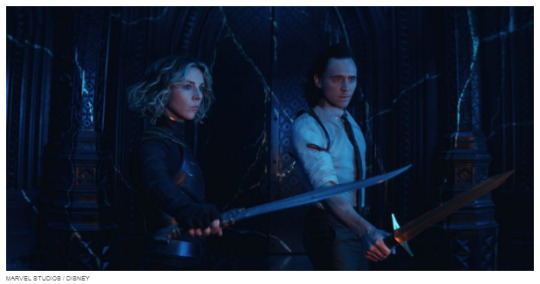
But by centring the so-called "antagonists" like this, a different kind of villain problem has risen, like a seemingly dead baddie who thrusts one hand up from the grave just as the credits start to roll.
Since Loki's very first episode, there's been endless speculation on who the Big Bad might be. The mysterious Loki variant who showed up to kill TVA soldiers was perhaps the most likely candidate at first, but things took a surprising twist with that Lady Loki reveal (although given that betrayal at the end, Sylvie certainly did make a good case for her being the show's true Big Bad).
And then of course, other villainous candidates soon raised their heads. Everyone from Ravonna and the Time Keeepers to Alioth and President Loki all played a "bad" role to some degree. Loki's willingness to tackle the greyer areas of morality has been a strength of this show. But throughout the first five episodes, there was always this idea that someone else, someone "bigger" was waiting in the wings, controlling the TVA from a distance.
The penultimate episode leaned heavily into this idea with a final shot that practically begged fans to speculate about who could be hiding away in that castle beyond time. And then the finale arrived with the big reveal of He Who Remains, "a ruler" and "a conqueror" who also refers to himself as a "jerk" of sorts.
If you're not a fan of weighty exposition, you might consider him to be a jerk as well. Jonathan Majors does everything he can to sell these scenes, but when you break it all down, the vast majority of this final episode was dedicated to explaining an entirely new character whose arrival made little or no sense to casual fans watching back home.
On the flip side of that, He Who Remains was always the number one suspect for comic book readers who know their history. Kang, as this character is called in the source material, has been hinted at throughout the series, and Marvel even announced Jonathan's casting in the role months before Loki even started.
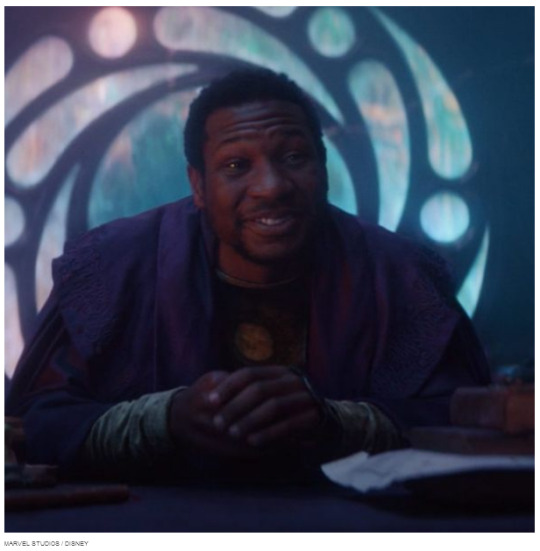
For some, Kang was the obvious choice for this reveal, which makes it a bit less exciting because it's so predictable. And then for others, it was the complete opposite problem. If you don't read the source material, then Kang's arrival came completely out of nowhere because his character wasn't even mentioned prior to the finale. Without comic book knowledge of Kang's identity, this just doesn't work as a satisfying end.
And even if you do know exactly who Majors is playing, what is there to actually gain from a random character showing up like this last minute? Loki has no emotional attachment to Kang beyond his manipulation of the TVA, and as a result of this, there's no closure. Thematically, another Loki variant would have made for a far more satisfying villain, one who forces "our" Loki to confront himself and his notions of what it means to be good.
Logistically, Kang's debut here isn't ideal either given that it required hefty amounts of exposition which slowed the finale to a crawl. While it was refreshing to see Loki avoid the usual CGI spectacle that often plagues the end of these stories, Marvel's incessant need to focus on set-up dragged things down in a different way here, forcing Kang in at the expense of the story that's currently being told.
It's thrilling to think about how this new multiverse will impact the MCU moving forward. The possibilities are literally endless, and we tried our best to outline some of the biggest ramifications to this big reveal right here. But what about the here and now? What about Loki's arc in this season and what about the viewers who couldn't care less about the wider MCU?
The ways in which this franchise connects everything together (much like the comics it's based on) is easily one of Marvel's biggest strengths, to the point where rival studios have desperately tried to replicate this format. But when vital plot points are introduced purely as a nod and a wink to fans who constantly look forward to what lies ahead, then this connectivity also becomes one of the studio's biggest weaknesses.
For decades, comic book giants like Marvel and DC have rebooted themselves and wiped the slate clean over and over again because they eventually become too inaccessible, weighed down by the sheer volume of backstory that newbies are forced to wade through. Marvel Studios has managed to circumvent this problem for the most part due to its widespread popularity, but sooner or later, people who don't have time to watch every single movie and show will start to resent stories like this that don't end to at least some degree.

Clearly, what was once a villain problem has become symptomatic of a much larger issue. But the essence is still the same. Characterisation is still being overlooked just to move the story along in whatever way Marvel sees fit.
And if this fixation on setting up the next project continues to take precedence over character and story, then shows like Loki run the risk of existing solely to continue one ongoing saga, like a snake eating itself in an endless loop.
Of course, fan expectation does play a role in this too, but when Kang said "We're all villains here," it's hard not to think that he might be referring to something far bigger and even more powerful than himself.
35 notes
·
View notes
Note
Almost every reviewer on YouTube wasn’t satisfied with this movie IMO they said it was just Marvel combined some elements from other marvel movies so they could throw fans a BW movie so we could stfu, it didn’t do justice to the the character ,what do you think, is it really that bad.
To be honest, I've been working on this one for a while but I keep writing and deleting my response. Because all the things I want to say sound gatekeeper-y, in one of several ways.
I think you can be a Nat fan and not read the comics. I think you can be a Nat fan and never talk about her. I don't think you need to know everything about canon and be an "expert" to be a fan. I'm not interested in a locked-gate version of fandom. I don't think this movie should just be for die-hard Nat fans. And I don't think that all Nat fans will like this movie, for a variety of reasons.
Despite all of that, a lot of the comic book/movie expert reviews I've seen feel, to me, like they were evaluating a movie that isn't the one this movie was ever trying to be, and missing some of what the movie explicitly says it is because that doesn't fit what they want from it.
A bit more spoilery and a lot longer under the cut. I am so sorry I'm like this.
This movie felt tailor-made for me. Not because I loved every answer they gave, but because the questions they asked are ones I've been waiting to hear since 2012, when I first saw Avengers and then immediately went back to see the rest of phase 1. I think people disliking the answers is a legitimate opinion, and I'm looking forward to detangling that with people. What surprised me in reviews was not reviewers disliking the answers, which is legit, but not even seeming to realize the questions had been asked.
Most prominently, what felt like the huge thematic arc of the movie to me has been nonexistent in so many reviews that I've started to feel like I made it up, even though I took notes of exact quotes so I could reference them. The movie isn't a Nat origin story, and it's not about her as a cool edgy villain, so not seeing either of those didn't bother me. It's a movie about Natasha's trauma and how that manifests, and how her attempts to break free of it have harmed others in the past, and how she can move forward from that. We never get the key that unlocks the history of Natasha's past, so if you approach this as a puzzle box, it's going to fail.
THIS INDENTED PARAGRAPH IS THE CLOSEST I GET TO DIRECT PLOT POINTS, FEEL FREE TO SKIP
Specifically most of the reviews seem to view Nat's motivating guilt as over how she escaped the Red Room, particularly one casualty she deemed an acceptable sacrifice. But as I interpreted it, Nat's guilt in this movie came from a much closer place: the other Widows were all she'd had, and Nat being able to escape the Red Room made the Red Room hold on to the other Widows that much tighter. She thought she'd taken it down, but she was wrong. So her freedom, essentially, came at their expense. Natasha working to take down the Red Room this time is personal both to avenge her own trauma and to make up for her guilt in the Red Room still existing and creating more trauma for her peers. Without this context (and to be clear, I have gone back over the quotes several times to see if I'm misinterpreting and I really don't think I am), the idea that all of her guilt is over what she did to a single person makes more sense, but it also makes the movie a lot less interesting. If Natasha is justified in blaming Alexei and Melina for condemning her back to the Red Room, how could the other Widows not blame Nat? To me the entire story swings from that, and by not acknowledging Nat's (inadvertent but still very real) responsibility for continuing the cycle, the movie would feel hollow.
PLOT POINTS OVER.
Many critics they seem to feel like the potential this movie introduced was wasted because Nat's dead, so what's the point. First of all, the point is she's Nat and we care. It's not like we went in to Iron Man expecting that we'd have a decade of a franchise; we cared in the moment, and this movie is asking for the same thing. It delivers for over two hours of NOT murdering Natasha, which is more than I can say for Endgame.
To be clear, BW does set up other things for the MCU, and it's but if you're only watching it for what it's going to tell you about the future of the MCU (and I get it, because that's how I'm watching Loki, and it's a very different type of watching than I did for FATWS), this probably IS going to be a disappointment, because this isn't a big crossover event movie; I mean, none of Sam's "Big Three" show up at all. But again, that's about the movie someone wanted it to be, not the movie this was aiming to be.
Is this like a lot of other Marvel movies? Kinda. It's definitely taking a lot from Civil War for its set-up. Its arc felt like a close mirror of to Winter Soldier to me, to the extent that I'm planning to rewatch that on Thursday so I can see how much that's just me projecting my fave onto it. The third act is very Marvel-third-act-y, as adapted to Nat's character; the adapting to Nat's character are the parts I like and the rest is kind of what I consider the MCU price of admission.
I also kind of hate that it feels like the last few movies- Black Panther, Captain Marvel, now this and some rumblings about Shang-Chi- have all been kind of dismissed with "it's just the Marvel formula." It is, but that doesn't change the fact that different protagonists make it different. Dr Strange is pretty much just "Iron Man 1 with cool magic" and people didn't mind, but "how does this formula change when the protagonist is fundamentally different than the archetype to this point?" is apparently not different enough. I get Marvel fatigue, I really do, but for me it's tempered by how, in this case, Nat doesn't have the moral clarity Steve or Thor or even Tony or Scott has. No one in this movie lets her forget that she's a trained killer who little kids look up to.
Again: there are parts of this movie that don't work. I also don't ever ever EVER want to seem like I'm saying that if someone didn't like this movie they're not a real Nat fan or they're wrong. I know there are reasons to not love this movie, and I'm sure I'll figure out more the more I watch- it may not make me not love it, but it will at least complicate it for me, and i think we all know I live for that shit. Moreover, I intimately know how much it sucks when something you've been enthusiastic about and anticipating for ages doesn't pay off and everyone else seems to like it- it's isolating and upsetting and you just sit there wondering why no one else understands, and that's bullshit and I wouldn't wish it on anyone. People who don't like this movie are valid!
But if someone has a history of seeing Nat as just background, or considering her as a T&A deliver system more than as a character, or caring about hot women with guns but not care about the trauma that turned them into that, or saying they like movies about women but just not THIS woman for every comic book movie about a woman not there for them to ogle, or claiming to be experts in all things comics while doubling down on their theory that Yelena wouldn't appear because she was in Agent Carter (YES THAT HAPPENED, MORE THAN ONCE, THE NORTH. FUCKING. REMEMBERS. AND WISHES THEY KNEW WHERE THEY SAVED THOSE SCREENSHOTS), I don't need to weight their reviews heavier than the adrenaline rush I felt watching this movie.
So in answer to your question, I don't think the movie was really "that bad." I think this movie delivers in very specific ways, which definitely are not the flashy ones or the "every Marvel movie builds to the next great EVENT" ones or the male power fantasy ones, and if those ways aren't the ways you care about, it's going to be a disappointment. Even if those AREN'T the ones you care about, it could be a disappointment for any number of reasons, some of which I noticed during the movie and some of which I'm sure I'll be surprised to read about Friday morning.
But it wasn't one to me. For whatever it's worth, despite the movie's flaws, I loved it, I haven't stopped thinking about it in five days, I can't wait to see it again, and I hope that whether other people do or don't like it, they want to roll around in it as much as I do to pick out every single shred of canon worth overanalyzing.
If this is all we ever get for Natasha- and it is a CRIME if this is all we ever get for Natasha but that doesn't mean it's not so- I am grateful that this is what we got.
#allofthereplies#Anonymous#Black Widow movie spoilers#BW spoilers#I mean I tried to make this not that spoilery but I'm sure I didn't completely succeed#also warning for long post#extremely long post#again: I am so sorry I'm like this
31 notes
·
View notes
Note
I'm not sure if this question has been asked before, but what would be usually the reason why people would torture someone? Not to justify (torture is unjustifiable in any situation) but I really needed a driving force for a villain why they would w/o sounding ridiculous or implausible, and any reason I come up with falls kind of flat (... Which I suppose is expected, since that's how the reasonings behind tortures are in rl I guess)
I can help you out here. And I want you to know that from a writing stand point this does make perfect sense. Motivation, however shallow, is important for capturing a character.
Yes a lot of the motivations in reality are flat, shallow and outright stupid. And it can be a careful balancing act, showing those motivations making them understandable without straying into justifying them. It can also be hard to make an interesting character with flat motivations.
I think I’ll start off with talking about motivations/‘reasons’ in reality and then talk a little about when and whether we should break from reality when we write about torturers.
Remember that there isn’t a lot of research on torturers. So I’m working from the little bit of research I can access, interviews with torturers and anecdotal reports. It isn’t perfect, but this is (so far as I can tell) the best information we have at the time of writing.
Understanding why torture occurs means understanding that it is structural violence.
I do take questions on abuse, I personally don’t see much point in sticking to the strict legal definition of torture when I’m trying to help authors do a decent job portraying trauma survivors. But sometimes the definition matters. And torture is essentially defined as abuse by government employees*, by public servants in positions of authority.
Over and over again the reasons torturers give for their crimes come back to flaws in the organisations they were part of. Consistently, across cultures and time periods, they describe understaffed, high pressure environments with no training, little supervision and the instruction to produce results or else.
This combines with cultural messages that violence ‘works’ and existing sub-cultures of torturers within organisations to perpetuate abuse.
It’s also worth mentioning that for most torturers they’re coming into an organisation where there are already established sub-groups of torturers. The group dynamics do seem to play a role in all this. Though it’s difficult to say how much when we’re entirely going from what torturers say and they are… demonstrably inaccurate when it comes to talking about torture.
Having said that; torturers do seem to encourage each other to more and more acts of violence. They treat it almost competitively. They will also, sometimes, approach new recruits and bring them into the torturer sub-group, pressuring them to participate.
I’m unsure how much of a role the social factor plays in torturers starting to torture, but it definite seems to keep them torturing when they say they’d rather stop. There are a couple of reasons why.
First of all there’s a sort of implicit threat; refusing to torture is seen as a threat to the torturer sub-culture. And these are people who have already shown a capacity for violence. There have been cases of torturers attacking other members of the same organisation for their opposition to, or refusal to, torture.
There’s also a social aspect; once involved with the torturer sub-culture the individual tends to become more and more cut off from the rest of the organisation. The group of torturers becomes more or less their entire social circle.
We’re social animals. So leaving, rejecting the entire social group, is a big deal. It’s hard for us to do.
The toxic sub-culture torturers form encourages them to root part of their identity in their capacity for violence and how ‘good at it’ the other members of their group think they are. They tend to tie ideas of toughness, dependability, achievement and (often) masculinity to torture. They frame themselves as especially manly, strong and ‘willing to do the tough jobs no one else has the guts to’.
It’s complete nonsense but it’s what they do.
And it means that facing up to the fact torture is pointless feels like an attack on their self worth. A lot of them choose to double down rather then face that reality.
This isn’t a definitive list of relevant factors. It’s my assessment of the ones that always seem to show up. There are usually other factors that feed into particular situations. Rejali’s Three Systems is a worth a read on that front.
Ideas about social hierarchy and transgression are common features. So things like ‘anyone who does That Terrible Thing deserves to be tortured’ or ‘no one Like That would be in this part of town for an innocent reason’.
All of this means that motivation can be tricky to write, because the real motivations are often not the sort of thing we’re taught are ‘interesting’.
Real, honest motivations are often things like:
‘I think those people deserve it’
‘I was told to’
‘Everyone else was doing it’
‘I couldn’t think of anything else to do’
‘I got angry and took it out on someone else’
‘I thought it would work and no one ever taught me another way’
That’s not a definitive list but you get the idea. And probably get the point about these sorts of shallow motivations being narratively unsatisfying.
So let’s step back from the reality and tackle the writing problem at the heart of this: how do we make this interesting?
There are a couple of different approaches.
The first approach I see is to accept that the motivation and the villain are shallow and shift the interest away from the villain.
Villains don’t need to be interesting. And they don’t need to be the focus.
If your story is structured in a way which primarily makes the villain a looming threat and focuses on the heroes, their journey, their relationships then adding detail or depth to the villain is unnecessary.
The Lord of the Rings trilogy does this with several of its major villains. The Shape of Water does it for the main villain. Zelda: Breath of the Wild (yes I bought a switch during lock down, and it’s my first Zelda game I am not sorry) does it with Ganon.
Another approach is to accept the motivation is shallow and shift the focus away from the villain’s motivation.
Villains do not need to have a grand philosophy or deep motivation or underlying pain in order to be a good read. They don’t need to be an intellectual threat to the heroes in order to be a legitimate threat.
For instance Joker in Batman: The Animated Series, I’d argue one of the best takes on the character ever. But if you go back and watch the episodes he isn’t deep. His motivation almost always boils down to pettiness, greed and a vindictive streak a mile wide. It is incredibly shallow.
But he’s fun to watch, because he’s unpredictable and funny. He’s also a legitimate threat to the heroes because he’s so incredibly destructive. More then any other villain his crimes are aimed at effecting large numbers of people. That sets the stakes high without any motivation or philosophy coming into it.
The focus is on what he does each time he shows up, not why.
Persona 5 pulls off a similar trick. Every single one of its villains has a shallow motivation. But each of them also has power over one of the heroes or another innocent person. They don’t need a deeper or more interesting motivation in order to make life miserable for the heroes. And every caper hinges on the heroes trying to stop that worst outcome.
As much as Fullmetal Alchemist is a deep story which touches on many complex topics, neither version (the original manga or the 2003 anime with it’s very different plot) had a particularly complex villain at the end of the story. In both cases the ultimate leader of the ‘bad guys’ just wanted more power. And didn’t care how many lives they destroyed to get it.
Not all stories need a Killmonger.
It’s always worth taking the time to consider what your story needs, rather then what’s fashionable in fiction at the moment. On a personal note some of my favourite stories have been either entirely focused on the heroes or had explicitly shallow villains.
The reality is that most of the time motivations for large scale atrocities are shallow and unsatisfying. Giving fictional villains deeper or more complex motives can work, but it can also mean twisting the narrative up to make it look like the villain (and hence their actions) are more reasonable then they are.
Killmonger’s twisted vision of what would make Wakanda ‘better’ works in Black Panther, just as White Wolf’s similar motivation did in the comics a decade or so earlier. They work because they’re directly competing with the hero’s vision of what would make the world better. And because ultimately it’s about showing why T’Challa’s way is better then the villain he’s facing off against.
But I can think of other stories where giving the villain a ‘deeper’ reasoning just served to make them look reasonable. While they were arguing for torture and genocide.
And… I just think we’ve got enough of that in real life.
At the end of the day your villain should be serving a role within the story you’re creating. Motivation is one of many ways that we try to make sure they serve that function effectively and entertainingly.
But, despite what some people would have you believe, it ain’t the be all and end all of whether a villain or story is entertaining. Personality, plots, aesthetic and sometimes how satisfying it feels to see their day ruined, all feed in to how well a villain works.
The threat they represent in the story isn’t dependant on whether their motivation is deep or nuanced or rational. It’s about their ability to follow through and sometimes the horrific nature of the desire itself.
So I guess a lot of my advice here is to consider what your villain actually needs to do in the story. Then take a step back and consider whether deeper motivation adds anything to that.
Be aware that the more complex motivations and drives you add the further you’re getting from a realistic torturer. Which is not inherently apologia, or inherently a bad writing idea, but consider what any deviation from reality implies.
I hope that helps. :)
Available on Wordpress.
Disclaimer
*The international definition can include groups that control territory, ie an occupying force. In some countries the definition is slightly wider and encompasses some international criminal gangs.
#writing advice#tw torture#writing torturers#behaviour of torturers#motivations of torturers#threatening villains#motivation#writing villains#effects of torture on organisations#defining torture
78 notes
·
View notes
Link
“...Bucky comes from the Jim Crow era and hasn’t really socialized that much, whereas Sam is very much a black man of this time, so what can these two stand to learn from each other as they embark on this global journey together?”
Sebastian: “Bucky’s gotta come out of his shell, you know what I mean? And learn to accept the past and, and move forward and get to know the world as it is, you know? And who else to better introduce him to that than Sam Wilson?”
Anthony: “I think both characters, coming from where they came from and being the men that they are, they realize that the world has changed and evolved. The Blip has put us in a position where we no longer are accessible to the way of thinking that was before the Blip. That’s what gave us Thanos. So, both characters are smart enough to know that the - the future is different, and they’ve always been progressive enough to see that and move along with it.”
Kari: “Both Sam and Bucky are facing - you know, from a personal place - issues that - that are very real world. Sam’s family’s in crisis and Bucky is in his own crisis because he’s dealing with guilt issues. He’s got mental health issues; he’s trying to navigate what the consequences of his actions are.”
Malcolm: “We say it like this. Bucky showed up with more baggage than any hero in Marvel history, right? And we took all that baggage and distilled it down to a single storyline and a single character that he’s dealing with. If he fails, he is the monster that he worries he might be. And if he succeeds, he’s reborn as someone that might actually be worthy of becoming a hero in his own right. Because in Bucky’s mind, he’s never been a hero.”
Kari: “And then we have, you know, the discussion of the shield. Because Sam was given the shield, and he says: ‘it doesn’t feel like mine’. And he has to decide if it is his, and what is it for a black man to pick up that shield? Is it both good and bad? What is it for the black community? Is it relevant?”
Malcolm: “Sam’s reaction to the shield is not what people expect. The journey in dealing with the stars and stripes is not an easy one for him. Rejecting it is hard, and accepting it is extremely hard, you know what I’m saying? The stock he comes from - I don’t wanna spoil it - but there’s a long legacy of black folk who come from that stock. When you see these unique scenes that he has, confronting these villains, and you see him respond in a way that isn’t typical for a superhero, the audience now will have a deeper understanding as to how because they got to spent time in his personal life, and regarding Anthony - we stole a lot of his personal life to create that personal life for Sam.” (laughs)
“Oh, wow.”
Malcolm: “Yeah.”
“What are you excited for fans to see, because this is the first time we’re going to see them in this light?”
Sebastian: “Just for them to get to know them better, you know? To spend a day in the life of Sam Wilson and Bucky Barnes as - as we haven’t seen, you know? And - and that actually ends up being much more relatable than all those epic times you’ve met them in the movies.”
“This episode confirms that, you know, as Avengers, you don’t really get paid for your work. I’m curious about what your reaction was when you saw that in the script, and do you think the Avengers should unionize - for benefits?”
Anthony: “I think that was called Civil War (laughs). No, we definitely should. I think, you know, it’s interesting; I always ask the question, like, you know when the Avengers show up, they destroy whole cities and just, like, crush people and how - what do they do for a living? Like - where, where does their money come from? Always believed it was Tony Stark and, you know, ‘cos, he owns - ob - obviously, he owns an Audi dealership somewhere. The idea of them making a living at what they do - I , I don’t think that’s the important thing. I think they do it for the betterment for the world, for saving people’s lives. So, they have their ins and outs, their odd-jobs to make sure that they’re taken care of; government sponsorship, funding, government housing.”
“What was also nice...in this first episode was seeing Rhodey there and just like the mentor-sort of mentee relationship...can you just talk a little bit about what that relationship means in this series?”
Kari: “You said it; it’s sort of got a bit of a mentorship kind of quality to it, It’s also - you know - very relevant to the story of Sam and the shield and what he’s gonna decide. Rhodey is kind of posing the question: ‘Is there going to be a world where nobody carries the shield?’ Allies have become enemies and the world has changed. During the blip obviously there was a certain amount of cooperation, much like our pandemic; shared grief, shared loss, and so you had a world that was cooperating in a different kind of way and now you’re post Blip, and all of a sudden, people want it to go back.”
Malcolm: “We were all in love with the idea like, you know, Marvel’s two black superheroes - the ones that are most well known anyway - ‘cos, you know, T’Challa’s African - they’re African-American. There’s a shorthand that they have together, you can imagine, you know what I’m saying? - where all the issues Sam is coping with, with, with Don Cheadle, with the actors on that level - by - by them just pausing and being silent for a minute, the audience can fill in the blanks and just having them two brothers on the screen at the same time; that was huge for me, man - I , I, I - I just; I geeked out over that, you know?”
“...outside of Black Panther, you don’t get that moment really.”
Malcolm: “That’s right, and like I said, T’Challa and Black Panther basically shattered all the biases against black heroes, but if we’re taking about identity, T’Challa is a King, and T’Challa is African. And though he does deal with some of the same issues that Sam and Rhodey might, they have a unique perspective on the world.”
“And we do know that Sharon Carter is gonna be in this series. What can you say about her role and her dynamic with the team?”
Malcolm: “She’s - she is flipped. Not flipped out or crazy or nothing like that, But Sharon has - if, go watch - if the fans watch Civil War - they can fill in the blanks on what Sharon has probably had to deal with and so when we meet Sharon, she has definitely evolved. The term I use, it’s not dramatic or nothin’, but she has definitely grown up.”
“...there’s going to be threat that brings the Falcon and the Winter Soldier together, so can you talk about what this threat is and how that sort of forces the Winter Soldier and the Falcon to sort of team up?”
Kari: “It’s relevant to the - the blip and as I just said, the fact that world has, you know, now enemies and al- allegiances have changed; and it’s all changed quite quickly. In the opening action sequence, we get a taste of what that is; that it’s - it’s kinda of - it’s a bit unwieldy. And so, we’re gonna discover, through, through the course of the next episodes just what that means.”
Malcolm: “We wanted the crisis that the heroes were dealing with to be something that every single fan could - could look at and be like ‘Oh, I identify with that - that’s a very real; that’s a very real crisis.’ We wanted these villains to be born from this crisis and we wanted our heroes to have to be approaching them from a point of view that is so human and anchored in modern struggle today that this whole piece feels like the superhero franchise of the future.”
“...can we expect some easter eggs or some, you know, cameos...?”
Kari: “Well there’s always - there’s always easter eggs, and what’s wonderful about Marvel and MCU is each series is very much it’s own unique animal. So, ours is very different from WandaVision and so obviously, you know, one of Marvel’s trademarks is the easter eggs, what’ll be interesting to see is if everybody catches them. “
8 notes
·
View notes
Text
The adventures of Diana Thorsdottir-Danvers -An AU
Another idea. But this is an AU to a twoshot I wrote some time ago on Wattpad. It’s in german, but I summon it for you.
After Infinity War, Thor’s depressed and Carol helps him out. They both go to space, Brunhilde becomes the queen of New Asgard. Long story short, Thor and Carol come together, fight against Kree, have a child and because the universe is screwed up thanks to Thanos, she becomes pregnant, makes some timetravel without knowing it and gives birth to a girl. Diana Thorsdottir-Danvers. She has the same powers like her parents, but because she’s half asgardian, her powers of her mother are even stronger than Carols. Anyway. Diana is a sweet girl, grows up faster because of Thanos and her being an asgardian. So she’s in her late teenage ages, when her parents fight against Thanos and she suddendly disapears. In my story on Wattpad, she lands on Olympus, meets all the gods and after some drama and all, she comes together with Apollo. Her parents find her again, meet the gods, Thor and Zeus try to kil each other, Carol steps in and yeah. Diana becomes then the wife of Apollo and such.
Now. In this AU, everything happens the same, but when she disapears, she lands in the DC universe. She knows, it’s not her earth, bc of her smart suit (she has one like her mom (her colors are blue, red and silver, basically the same like Carol)) and she sees some heroes and villians, she’s pretty sure they are not on her earth.
So, what to do now? She has no way to go home and has not the nerve to interact with this arrogant heroes, so she starts to write. (Yeah I know,she shoud be start searching a way hime, but she’s immortal, she has plenty of time) About Captain America, then her mother, and then the first appearance of the Avengers. She writes about the Agents of S.H.I.E.L.D., about Ultron, about Thanos. It takes something like one/two years until she wrote down the history (of the Avengers and all the other heroes) from her earth and then goes to a publishing company, who are mindblown. She wrote... wait a moment, I need to research all the movies and series- 35?40? books (movies with series, the whole mcu basically until infinity war) about a whole new universe, with whole new heroes.
So, they start to publish the books and make three phases, like the MCU. While people read her books, she writes the final, endgame. And she calls it; Avengers Endgame, The End Of The Infinity Saga.
People absolutly love her books, they are so realistic, even the heroes, they have mistakes and are just human, all the details match perfect with fantasy and what happend real. They absolutly love the different groups of heroes and also like it, that most of them don’t care about this ‘no killing’ rule. Because Diana was bored, she drawed the covers herself, the first movies (captain america 1, iron man 1, thor 1, black panther 1, spider-man 1, hulk, agents of shield first season, avengers 1 etc.) show the the upper body of the hero, without face. The sequels show more of the place where the book takes plase, Infinity War shows Thanos with the Infinity Stones and Endgame all the heroes against Thanos. In the books themself, she placed some doodles, while the characters do casual things or are in a fighting pose... and yeah.
Not even a year after the first release, Diana Danvers is famous and some filmproducer approach her, wanting to make movies. And there are only the books until the second phase released. Many fanarticles show up and Diana creates the firma MARVEL (breaking the fourth wall, heh) and makes millions in seconds. But she doesn’t really want’s this money, spends as much as she can and just uses the money she truly needs for herself and the company. People love her even more. And some hate her, but she doesn’t care.
She begins to write side stories, who still happen while the Infinity Saga, but are not that important. Now, she knew about the important things, since her mother is a part of S.H.I.E.L.D. and her father is important too. But what happend truly to Black Widow and Hawkeye? What did Captain America do, after S.H.I.E.L.D. has fallen? What did Thor do after New York? What happend to Loki, when he met Thanos? (Her fans absolutly love Loki and he becomes one of the most liked characters, after she writes, that he has been mind controlled)
Her fandom becomes bigger than the one of Percy Jackson, she’s close to Harry Potter. She broke some records and won many awards and after everything until Infinity War has been released, she was the most famous author of the world. (unrealistic, but do I care? nah not really) She solds more books than J.K. Rowling and even more await Endgame. When she announces, that the first movie is coming up (captain america), they loose their absolute shit. Because this is going to be fucking awesome. Diana herself writes the script, leads the casting and directs the movies.
Now you certainly ask, but what about her home? Well, Diana clearly misses her parents, but that’s it. She doesn’t really have any friends, her whole life she fought with her parents against the Kree and other bad people, who tried to control other ones. She made her peace, that she’s now on another earth.
Anyway. She’s something like 23 years old, in the middle of writing Endgame, when she’s kidnapped by the Riddler. He asks her some riddels, admits he’s a great fan, while she just rolls her eyes.
“Look, I’m in the middle of writing Endgame and I need every minute-” Riddler starts to apologize and releases her, asks for an autogram, while the whole world watched. Diana didn’t even need a hero, she just hugged the Riddler, told him he had some good Riddles, can she also tell one?
“What happend in Budapest?” The big fan Riddle is, naturally understands and thinks hard, until his eyes widden.
“Are you writing it in Endgame? Or did you drop any hints and we don’t see the whole picture...” Riddle thinks hard and Diana just walks away.
The next time she’s kidnapped, it’s Joker. He’s much more serious about this whole thing and won’t release her so easily. Naturally the whole world watches again and can see, how she tells him to fuck off, because she has a time limit and she still needs some drawings. Joker snarls and slaps her, she just stares at him with blank eyes and spits in his face. He gaspes offended, grabs her hair and wants to yank her head back, but Diana headbutts him, stomps on his foot and slams her whole body against him. He definitly didn’t see that coming. Before anything more can happen, glass shatters and Batman comes to help. Or so he thinks. Because Diana keeps a groaning Joker on the ground, stares at him hatefully, hisses some cruses about him and how she needs to work. Batman just blinks, sighs and shuts the camera off. He helps her, knocks Joker unconscious. Diana thanks him and walks off.
“If you would just kill him, then he wouldn’t cause such problems.” Batman blinks again, but the woman is already away.
Her fans love her for kicking villain ass, being so sarcastic, almost cynical. Some villians try to kidnap her, but she becomes angrier every time. Because damn fucking gods, she’s trying to work, her book is going to be released in a month, the movie is in the middle of shooting and she doesn’t has the time for this shit. Her videos go viral, kicking male villians in the groin. Female villians don’t even try it, because first, they love her books and they would never hurt her. And second, they don’t want their ass kicked.
After she’s caught in the middle of a gang war in Gotham (she’s there for some meeting) her partners/workers/assistants have enough. They force her to hire a bodyguard, because- No, Miss Danvers. You can’t march against the villains by yourself, you are still a civillian, let the heroes to their work.
Because I love Jason Todd and he’s known as a bookworm, he becomes her bodyguard. He’s the head of security of Wayne Enterprises and Bruce rather likes the girl, he talked with her at a Gala and he wants her protected. Even if she doesn’t has black hair. But still does have blue eyes...
Anyway. Jason becomes her bodyguard and because she’s such an attraction for danger, he’s around her 24/7. They become close, he watches her work, while he ‘protects’ her and yeah. Some real cliché story about a rich girl, who falls in love with her bodyguard. ehm... I don’t care.
So, Endgame is released and is the most selled book from Diana. Her doodles became drawings, they are much more detailed and some even with colour. The fans finally know, how Diana sees her heroes and notice, they look like many known actors.
“Well, some have to play my charakters, no? I saw their work, I have a good eye for these things.” Totally a thing Diana would do, cast actors for movies who are planned in the next few years. Not even asking them, because she knows, that they will do it. And then she announces, she’s going to be Captain Marvel, because Carol Danvers was inspired by her mother and she wants to honour her. The world loves it. The creator of this legendary books playing one of the most powerful charakters.
Meanwhile, Jason became her assisstant/right hand and is still her bodyguard. He stops being Red Hood, because the Outlaws are just nothing and he had now not the nerve working together with his family. One day, Diana suddendly speaks up.
“Why did you stop being Red Hood?” Jason jokes on his spite and looks at her shooked, but she just draws at her next cover. She finally writes about Budapest.
“What?”, he croakes out.
“I asked you, why did you stop being Red Hood?”
“How?” Diana just raises an eyebrow.
“It’s not that hard. I’m literally the creator of another group of heroes, where do you think I have my inspiration? And my father is a god, we have an eye for warriors.” Jason slowly progresses her words.
“A god? What the fu-”
“Yeah. Thor, the god of thunder.” At his wide eyes, she talks further.
“The asgardian with the hammer, you know-”
“You tell me, this whole thing you write is real? That Thor is your father and an Avenger?” Diana just smiles.
“And Carol is my mother... where do you really think I have my inspiration? I’m not some genius, I just wrote down the stories my parents told me.”
“So... there is another earth?”
“There are many earths... there is a multiverse. I’m just from a different universe.”
Jason definitly didn’t expect that. But is now even more interested in her stories. He’s the one, who tells her to become a hero. She becomes Tempestas, the partner of Red Hood.
And yeah... this it is.
If anyone wants to write about this, feel free! Just tag me, so I can read and reblog it :)
Masterlist
#marvel#mcu#dc#multiverse#jason todd#carol danvers#thor odinson#red hood#captain marvel#avengers#iron man#captain america#black widow#hawkeye#hulk#thor#actor#author#au of an au#story on wattpad#diana thorsdottir-danvers#joker#riddler#batman#justice league#wonder woman#superman#justhugefangirl writes {🥀}#justhugefangirl creates {🌹}#new story idea
8 notes
·
View notes
Text
The Cybersix comics
So now i’ve read most Cybersix comics that are available in English scanlations. Mainly Pharmadan’s stuff.
And it is very different from the cartoon adaptation previously reviewed here, very different indeed.
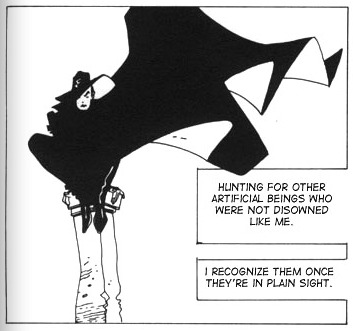
Anyway, the comics were created by Argentinian creators Carlos Trillo (scripts) and Carlos Meglia (art), in the early 1990s. And yes, i do think of them as Carlos & Carlos or the the two Carloses.
The premise is one i recognize from the cartoon adaptation. It is about the superhero Cybersix, a product of genetic engineering that has rebelled against her evil creator and fights the other products of his mad science, led by his clone son José.Her cover as a male literature school teacher named Adrian. She finds a friend in Lucas, the school’s biology teacher, with who she also sexual/romantic tension. Her allies include another product of the villain’s mad science, Data-7, who has the body of a panther and Julian, a street urchin she adopted.
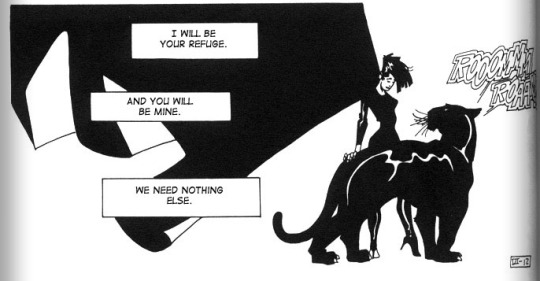
But the approach the comic book source material took to this is very different. The cartoon tv show is meant for children, even if it is on the darker side for such things. The comic is clearly meant for adults, and has a transgressive attitude with lots of violence and sex. And it is still almost 30 years later very shocking and offensive, it certainly was to me and I still kinda liked it. The word “problematic” has been much abused, but it still applies.
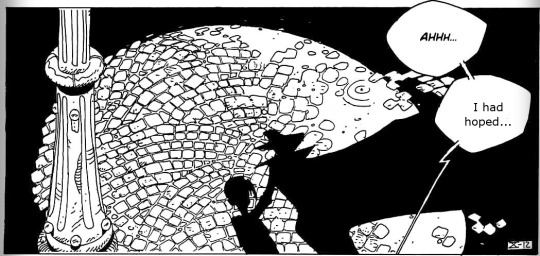
You could compare it to something out of the 90s “dark age” of American super hero comics, but to me the tone reminded me of artistic, provocative and very sexualized European comics, like something out of Métal Hurlant.
I’m therefore going to leave the rest of this review under a cut. Also it is getting kinda long. This might be a good point to put out some content warnings, ignore them at your own risk.
Content warning:: Discussions of: violence, racism, nazism, racist caricatures, sexualization of women, prostitution mention and (most disturbingly) sexual themes involving underage people (ick)
(most of this applies to the comic if you decide to read it, it can be worth checking out, but replace “discussion” and “mention” with just depiction, so be prepared for that.)
For one thing, the villain is clearly a nazi scientist who escaped from Germany to South America after the war. He is even named Von Reichter (the cartoon goes with Von Richter). This gives the comic a strong political edge. I don’t know exactly how controversial Argentina’s former status as a haven for escaped Nazis is in that country. But it probably is very controversial. Taking that subject in a critical manner might very well have been a genuinely brave move on part of the creators.

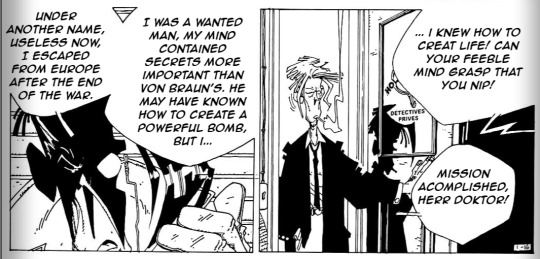
There is also the violence you might expect from a superhero comic. José is a particularly brutal villain this time around. Although Cybersix is remarkably non-violent. When she draws the sustenance she needs vampire-like from Von Reichter’s creations, she avoids killing them.
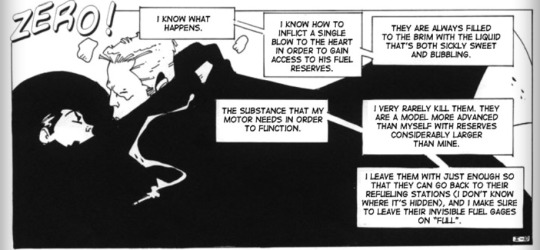
Concerning Cybersix’s gender, the comic doesn’t have the ambiguity of the cartoon. This time, it’s clear what her gender identity is, Cybersix is a woman.
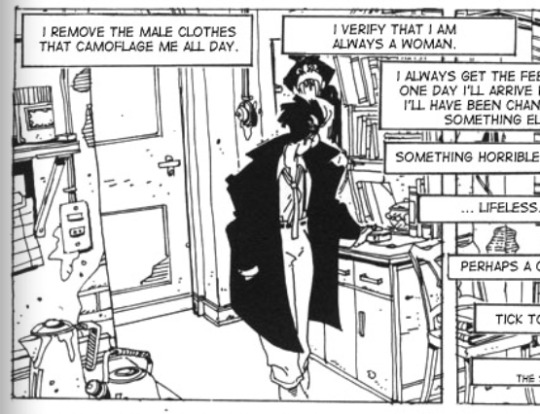
Her male identity is merely a disguise. Adrian Seidelman is a person who dies in a car accident who looks kinda like Cybersix, who has no legal status, and therefore she decides to steal his identity.
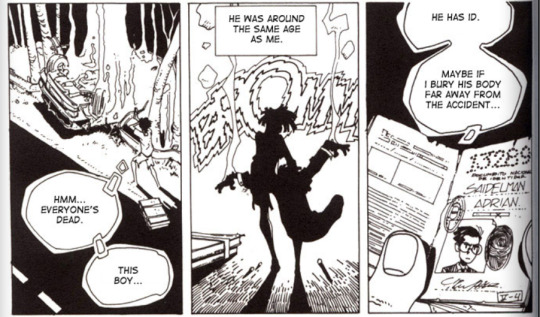
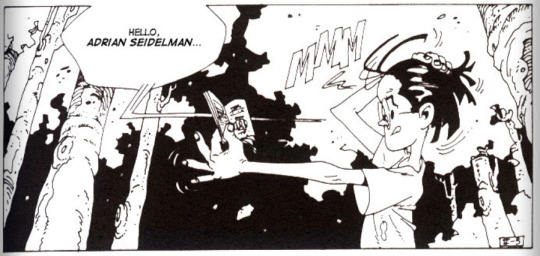
Cybersix remains an interesting character, but i frankly prefer the ambiguity of the cartoon.
Her questioning of her own humanity due to her origins was also in the comic and is a strong theme in her internal monologue here.
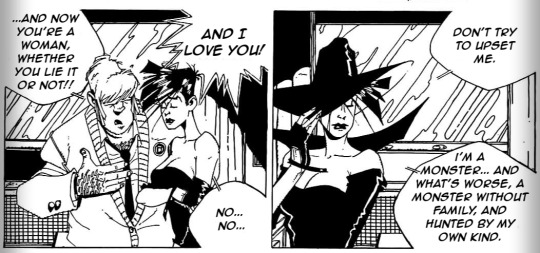
Interestingly from a gender perspective, she has this need to prove to herself that she is not just human, but specifically a woman.
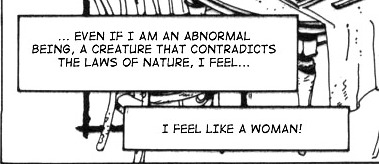
II is hard to avoid the subject of sexuality when talking about this comic, for it is almost omnipresent here. Cybersix is a very sexualized character. Her costume design is far from the worst example in comics, but like so many superheroines still designed with titillation in mind.
I found it hilarious that the comic’s actual explanation for the costume is that Cybersix stole it from the wardrobe of a literal sex worker. (the reason Cybersix broke into her home is that she was actually a Von Reichter creation that had infiltrated human society).
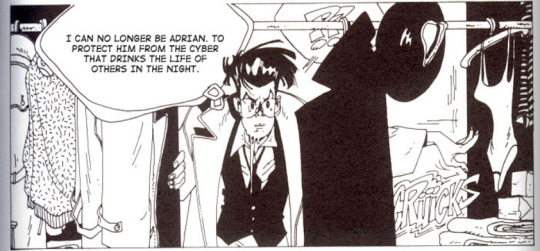
But this comic goes beyond most american comics and actually shows Cybersix naked surprisingly often. Her relationship with Lucas gets fairly explicit. If you find the crop of these panels odd sometimes, it’s because I’m trying to avoid showing something that breaks tumblr guidelines.
But the sexualization of Cybersix is actually a minor problem. The nude panels of her are almost quaint, like watching an old movie from the 70s which doesn’t bother to cutaway when a couple gets undressed. It isn’t really that disturbing, especially compared to the creepy sexuality in the rest of the comic.
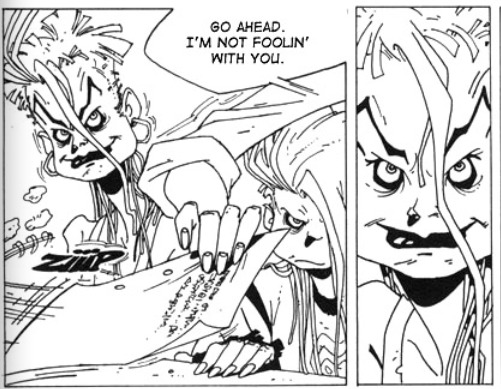
I didn’t mention Lori in my review of the cartoon. She is one of Adrian’s students who in the cartoon has a crush on him. That is kinda a disturbing theme in itself, but in the cartoon it is no big deal, because it is fairly toned down. In the comic, she is much, much worse.
She is obsessed with Adrian and very explicitly wants to have sex with him. Remember, Lori is a teenage schoolgirl. She also doesn’t care much for the concept of consent. For example, she mails Adrian her nudes unsolicited, and that is about the least worst thing she does. I’m not saying that isn’t terrible in itself, it is just that Lori does way worse things in this comic. You can understand this gets very uncomfortable to read about very quickly.
To be fair, while the trope of the sex-obsessed woman is often a male fantasy, it is very possible that Lori is supposed to be disturbing, rather than sexy. She is even drawn in a rather grotesque manner.
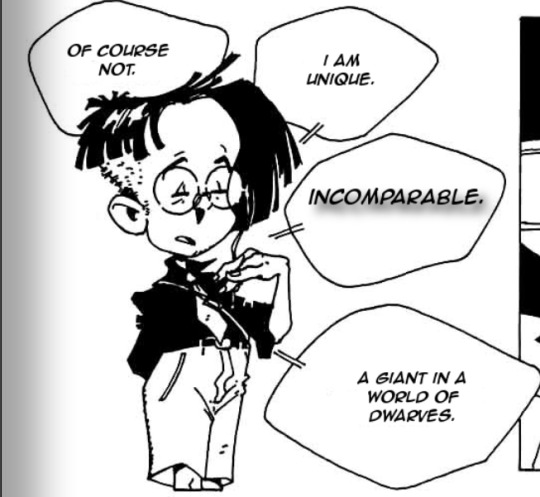
José is even worse. He has only the body of a child, but the mind of a man, including sexually. It isn’t nearly as prominent part of his character as it is with Lori, but this also becomes disgusting rather quickly, for obvious reasons. And then Lori and José meet and do it, oh my god. Although José’s sexuality is almost certainly meant to be creepy.
(because the world is full of people who can’t read properly I probably need to say: no, i don’t support pedophilia even if I think this comic also has its positive sides. Also, even though I can’t really speak for them and they have both passed away long ago, I’m pretty sure Carlos & Carlos didn’t support pedophilia either, if you can even call what horrors that go on in this comic that. Depiction in fiction doesn’t equal endorsement and all that.
This might be obvious from everything I written, but i have seen bad misreadings of what people write and the resulting misinformation spread so quickly on the internet, that writing out the obvious might be necessary. )
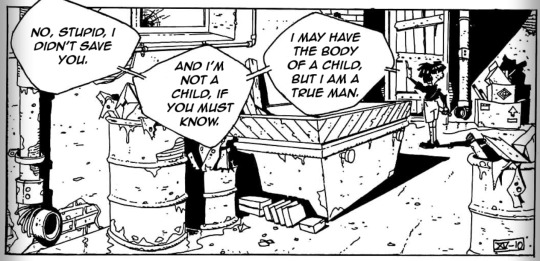
I must also talk about the depiction of race in this comic, which is odd. There are two important characters here, who are for lack of a better word, racialized.
One is a black man who saves Cybersix from Von Reichter when she was a child. She regards him as her father. The other is Miao Yashimoto, a Japanese private detective. His sister is kidnapped by Von Reichter, who forces Yashimoto to act against Cybersix, but he eventually becomes her ally.
Now describing them here, it doesn’t sound bad at all. That’s because their personality and role in the story isn’t the problem, it is how they are drawn. They, especially Yashimoto are very much racist caricatures. Yashimoto even has the stereotypical buckteeth. I won’t show you for obvious reasons, but you can always look up this comic yourself.
What is odd about this is that the intent clearly isn’t hateful. These are both heroic characters and the comic has a more or less explicit anti-racist message. A nazi is the villain for a reason. It is just that the creators clearly don’t realize the way Meglia drew these characters is not appropriate.
What is even weirder that Yashimoto was adapted into the cartoon, complete with buckteeth. And that was a show was made in Canada in 1999. Very strange.
Overall, the comic is very different from the cartoon and I have no idea why they picked this edgy adult comic as source material for.a tv show for children, but they did. It is surprisingly faithful to the comic in many ways. The premise is pretty much the same, only it is executed in a very different, child-friendly manner. I would argue that the cartoon is in many ways more enjoyable and accessible than the comic. The attempts of the comic to provoke its audience are often not successful, or maybe rather too successful.
As you can probably tell, my feelings on this comic are complex. I care not for the creepy sexuality or the hamfisted attempts to handle race. So I don’t know if I can recommend this comic. You do need a strong stomach for all this. But despite all that, there is still much to like about this comic The art is great; very evocative and atmospheric.
And the writing can be that too. Cybersix is still a great character. Her origin story, her existential angst and her difficult love story with Lucas are just as compelling if not more than in the cartoon.
Sadly, this comic is not widely available in English.The scanlations made or collected by Pharmadan is the most extensive and what I read so far. There is a person here on tumblr, who tried to continue scanlating them but they seem to have fallen prey to tumblr’s asinine content rules.and doesn’t seem to have been able to go elsewhere yet.
I’ll leave you with my favourite panel from the comic:
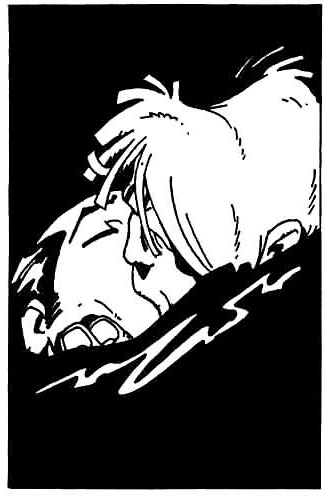
#cybersix#cybersix comics#carlos meglia#carlos trillo#pay attention to the content warnings please#comics made by men named carlos
27 notes
·
View notes
Text
Spider-Man: Far From Home Thoughts Part 1 a.k.a. MCU Chapter 23

As I did for Homecoming I’m going to split my thoughts on the film up based on looking at it as a film unto itself/part of the MCU and then separately looking at it in terms of being an adaptation.
However in trying to write the former section I soon realized it was more practical to further partition coverage of the film.
Because MCU films can be looked at not merely as part of a film trilogy/quadrilogy (or as the latest chapter in a specific character’s arc) but as installments in the wider MCU story. Spider-Man: Far From Home is in essence simultaneously ‘Marvel Cinematic Universe Spider-Man 2′ and ‘Marvel Cinematic Universe Part 23′. And those two lenses do affect how you evaluate the film.
So as such I’m going to have three sections across...however many parts it takes. These posts are something of a stream of consciousness so I’m aiming for 3 parts but we’ll see what happens.
Let’s start with how this stacks up as the latest installment in the MCU Saga.
On a scale of Iron Man 3/The Dark World/Captain Marvel to Winter Soldier/Civil War/Endgame, Far From Home sits comfortably in a middling position, much like its predecessor.
Like Homecoming it’s a mostly entertaining time killer, decent popcorn fun...just not quite as high quality popcorn fun as say Avengers 2012 or Iron Man 2008.
Speaking of Iron Man his post-humorous presence in the film illustrative of a strength and weakness of the MCU’s narrative style, hence I’m going to talk a lot about it here.
Whilst the MCU is often touted (even by Disney themselves) as replicating the comic books’ shared cross continuity nature, in truth it doesn’t.
In Marvel comics one can mostly follow Iron Man or Spider-Man or Avengers runs on their own. The shared universe is there and comes into play at times, but really you don’t need to follow everything.
With the MCU, whilst a lot of the films are accessible you really couldn’t just watch the Iron Man Trilogy and call it a day because Tony’s arc plays out across other films too, it climaxes 5+ years after his last solo film. In essence the MCU is like a TV show wherein you get 2-3 episodes per year and the season finales are the Avengers movies.
This is relevant to Far From Home because, despite what anyone tells you, this is the start of Phase/Season 4 and it feels that way (it more or less states that to you at the start of the movie). As such the film acts as MCU Spider-Man 2 but also MCU Chapter 23/MCU Book 4 Chapter 1 and HAS to address the fallout of the last episode/chapter/season finale.
Thus Peter’s arc in FFH gets hijacked as a kind of Endgame/Tony Stark post-mortem...sorta. We’ll talk more about that in another post, but understand that in so far as Tony’s post-mortem does hijack the movie it undermines Peter’s personal narrative.
However, in regards to the post-Endgame state of affairs it is rather unsatisfying, almost disrespectful.
And by disrespectful I mean that as the Marvel Studios logo opens up we have a rendition of ‘I Will Always Love You’ (the Whitney Houston version I believe) over poorly picked out, low res stills of all Avengers who died or didn’t come back in Endgame; to the film’s credit it does look like something a high schooler would make. That is followed by the first of two clunky exposition drops played for laughs and repeating the unrequited romance joke between Betty and Jason from Homecoming, complete with a focus upon Jason’s bewilderment over now being older than his little brother. Oh and let’s not forget the gag about the high school band turning to dust and then reappearing in the middle of a basketball game to wacky effect. The film even makes a point of not addressing if the Avengers are even around as a team anymore, which is likely a meta commentary as well.
I’ll give the movie this, it made it’s intentions clear. It was not going to really treat the aftermath of the biggest MCU movie with much weight, it was going to be a superfluous, light, fluffy funfest. That’s a stupid direction to adopt after Endgame but at least it didn’t try to trick the viewers that it would be anything else.
Now in spite of that tone and approach the film could still explore how the post-Endgame world has changed. Maybe we won’t get anything dark or dramatic per se, but at least we’ll get some information right?
In fact, as much as I had disdain for this film going in, seeing the post-Endgame MCU was what I was really interested in. And the film delivered on that...initially...in the very same clunky exposition drop played for laughs.
We don’t talk about the blip again apart from 3 or 4 quick references, one of which explained who Mysterio was and why he could’ve duped Fury.
As for how this affected Peter, it didn’t. Many speculated Aunt May might’ve survived the blip but no, we’re told very explicitly she disappeared too.
This is very much a mixed bag for FFH as an MCU film and as a Spider-Man movie (yes I know I said I was separating those two things but it’s more efficient for this next part).
On the one hand for those who want to follow the broader MCU story FFH gives them answers but brief ones. It’s the equivalent to simply googling the answer to a murder mystery rather than experiencing the story unfold towards that answer. We had a huge opportunity to examine the ramifications of such a globally changing phenomenon but we simply acknowledge it happened and then press on as though it didn’t. The same opening exposition makes that clear too when it says that they’re moving on.
On the other hand were the film to properly explore the ramifications of the blip it would hijack the whole movie, even more than the Iron Man post-mortem already was.
On the other other hand having everyone of relevance to Peter’s life (sans Happy and Tony) die and come back, keeping them all ‘synched’ with him basically, is extremely convenient.
On the other other other hand it’d derail his narrative in a huge way if MJ or Ned or May (who’s still not ‘Aunt May’ btw because fuck this movie) were suddenly in their 20s.
On the other x4 hand the presence of such a massively fantastical event like death and resurrection (along with aliens and space technology) has already derailed the verisimilitude of his solo films which began by painting themselves as comparatively more down to Earth and ‘friendly neighbourhood’ even in spite of alien tech being repurposed. The same applies to having him go on international adventures; yet another inconsistency between this and the last Spidey movie.
So it’s very much a case of pick your poison.
Getting back to this film as a Tony Stark tribute, when viewed as part of the ongoing MCU saga it’s presence and handling succeeds more than it fails.
As I said Tony began the MCU and along with Cap was one of the twin pillars holding it up, so his death demands examination. On a metatextual level we need a film grieving Tony Stark before we can move on to the next step.
So in this regard the film giving so much attention to the hole left behind by him and how that’s really the impetus for the entire primary plot of the film is incredibly fitting.*
This applies to Mysterio in a sense.
I’ll talk more about his place when compared to certain other villains in a future instalment, but in the context of this movie his role as a kind of evil Iron Man/pretender to Iron Man’s throne works well. In fact he’s an exceptionally great villain...for Iron Man.** You see where I’m going with this, but that’s for another post.
Lets switch gears a little and discuss another wider MCU element, Nick Fury. At certain points of the film I felt Fury was out of character and a huge jerk. But twist at the end that it was actual Talos mitigated all that, it made sense. It also addressed another huge problem I was having with the movie up until that point, the absence of other heroes.
Like in the trailers the movie takes strides to address why Thor, Captain Marvel and Doctor Strange can’t help out against the Elementals. But of course this leaves the huge problem of literally everyone else. You could make a case for Falcon and Winter Soldier being of little use against such seemingly powerful foes like the Elementals, but what about Scarlet Witch, Black Panther, Valkyrie, etc? Thankfully the Talos reveal addresses this as Talos is ultimately not Nick Fury so wouldn’t have access to all those heroes.
It also sets up for future films, implying the Kree/Skrull War is far from over and that we will soon be seeing S.W.O.R.D.
Really that’s all there is to say about the movie moving forward into the MCU.
We get answers but they’re underwhelming and unsatisfying whilst getting a movie grieving Tony Stark and making the audience feel his loss.
If only Spider-Man himself seemed to feel as upset...
*Too bad all the comedy and light teen drama crap undermines it.
**In fact the entire villainous crew and villain scheme revolves around Iron Man’s legacy. I guess that makes this film also a.k.a. Iron Man in Memoriam
#Spider-Man#Spider-Man: Far From HOme#MCU#marvel cinematic universe#peter parker#tom holland#Nick fury#iron man#tony stark#mjwatsonedit#Mary Jane Watson#Mary Jane Watson Parker#mj watson#mysterio#quinten beck#Aunt May#May Parker#Ned Leeds#Betty Brant#Molten Man#Hydro Man#Sandman#zendaya#Avengers#Avengers: Endgame
39 notes
·
View notes
Photo
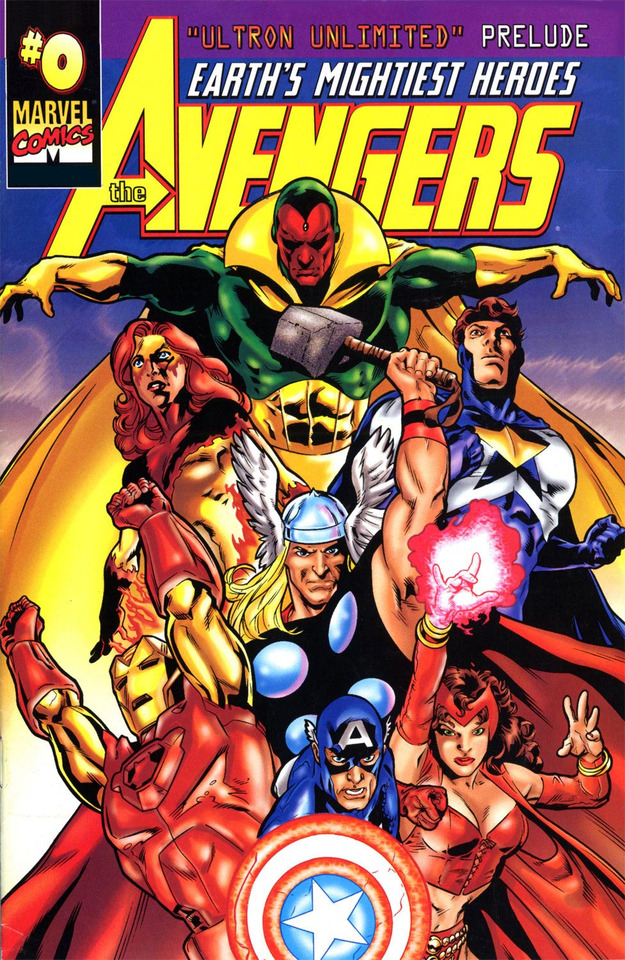
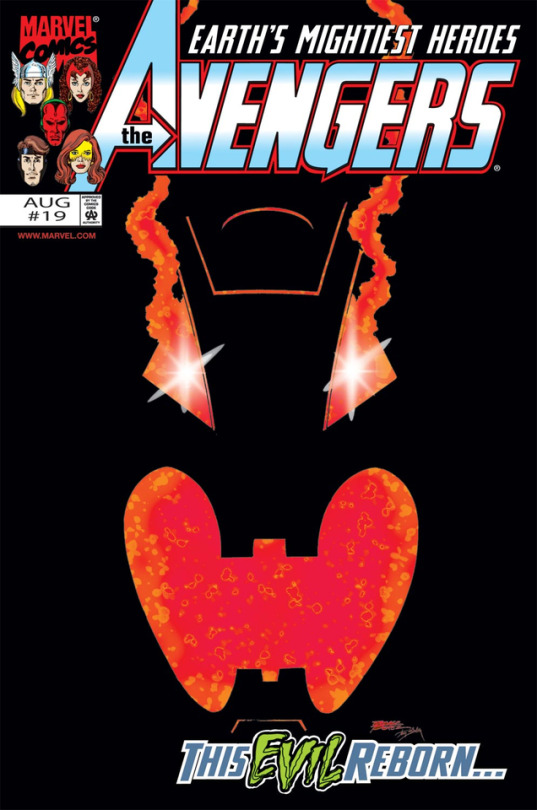
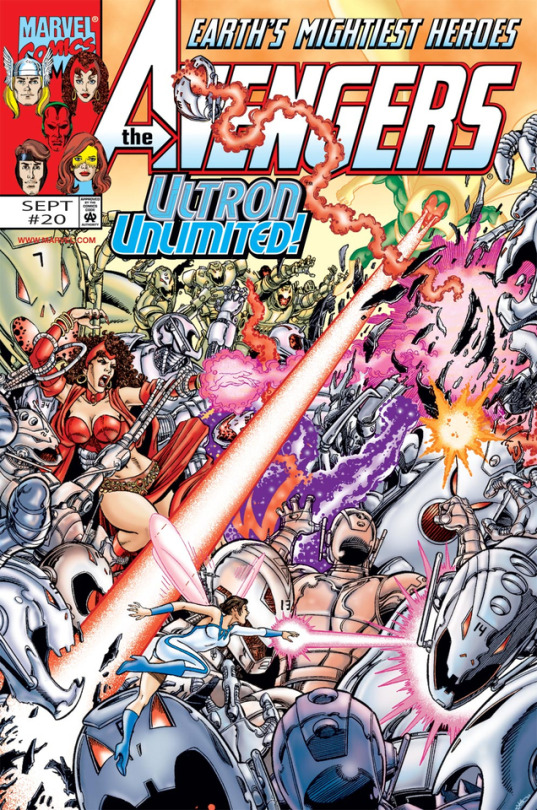

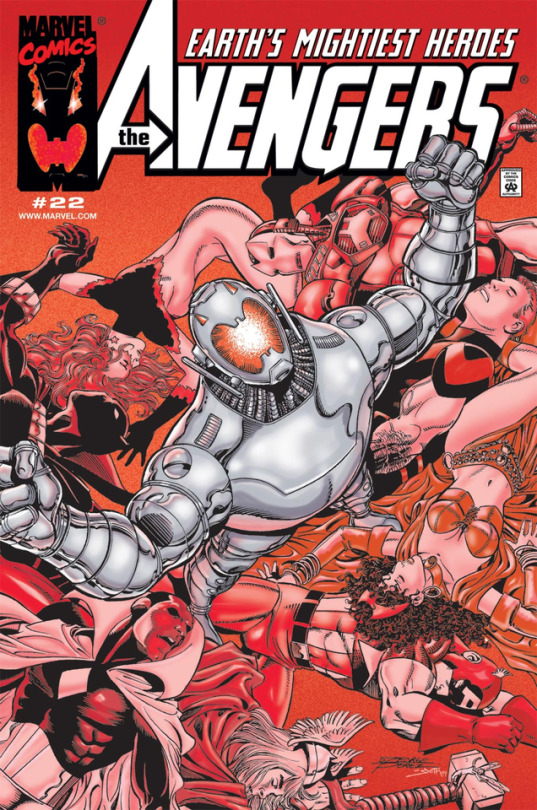
AVENGERS #0, 19-22
AUGUST - NOVEMBER 1999
BY KURT BUSIEK, GEORGE PEREZ, STUART IMMONEN, WADE VON GRAWBADGER, AL VEY AND TOM SMITH
SYNOPSIS (FROM MARVEL DATABASE)
Ultron watches The All-New It's Amazing's episode on the Avengers to keep an eye on them. As the television show progress, we see that Firestar and Justice are watching it from their home, Wonder Man and Scarlet Witch are watching it aboard an Avenger's Quinjet, and Triathlon and Jonathan Tremont are watching it at the Triune Understanding Headquarters. When Wonder Man and Scarlet Witch arrive at the hospital where Wonder Man's brother the Grim Reaper is being cared for, they exit the Quinjet only to discover that the hospital has been attacked and left in ruins by robots. Most of the people are either injured or killed, except the Grim Reaper who was kidnapped.

The The All-New It's Amazing episode recaps the history of the team from Onslaught to the present, then follows the team on a live mission against Flaming Sword. The eco-terrorists are holding Osborn Chemical Vice President Mister Standish hostage until Osborn Chemical agrees to quit abusing third world nations. After the Avengers defeat the villains, a team of reporters from various television news stations ask a slew of questions, many of which are designed to paint the team in a negative light. With that, the episode of The All-New It's Amazing ends and Ultron gloats of the Avenger's impending troubles at his hands. We then see Ultron on a computer monitor, where a female electronic voice and a metallic hand gloats that Ultron will be the one facing real troubles.

Justice and Firestar move into the Avengers' mansion. The Wasp dramatically breaks up a news conference and tells the Avengers that Hank Pym has been kidnapped. The Avengers then scramble and make their way to the Wakanda Design group plant where an adamantium being is rampaging. The adamantium being turns out to be Alkhema-2, and not Ultron, but she's keen on beating Ultron to the Avengers and destroying them. After an all-out force attack, Wanda completely short circuits Alkhema-2. Meanwhile, Ultron and his robot constructs have leveled the capital city of a small Baltic country.
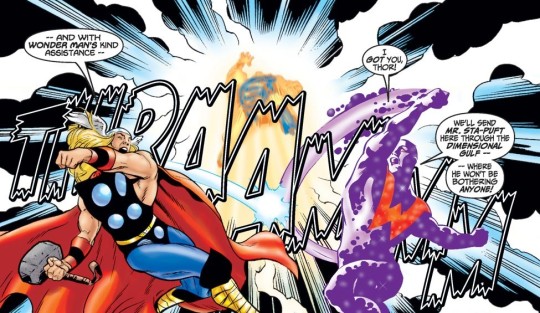
Captain America, Iron Man, Thor, Black Panther, Firestar, and Justice meet with US military officials at the Pentagon and are briefed about how Ultron destroyed the military, the zombie soldiers, the Black Brigade, Ember and killed every citizen of Slorenia within three hours before declaring it would be the breeding ground for his new world. The plan is for the Avengers, minus Justice, to lead an international force in retaking the country.
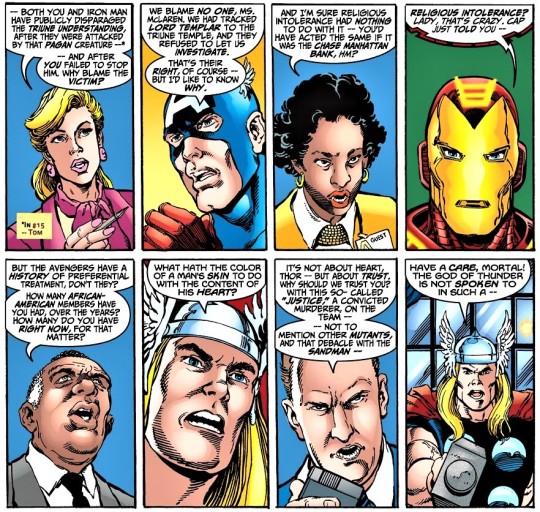
At Nugent Technologies, Vision, Wasp, Wonder Man and Scarlet Witch investigate Hank Pym's disappearance and destroyed lab as Wonder Man relates Grim Reaper's kidnapping from the sanitarium. Suddenly, an explosion occurs and an army of Ultron robots attack the team. They put up a fight but are eventually captured and taken away.

As the one half of the Avengers await on ships over Norway, beneath the old parliament building in Slorenia, Ultron holds captive "his family" and says they will be the seeds for his new race.

UN troops are being decimated by the cyborg citizens of Slorenia as the Avengers do their best in helping the soldiers advance as Captain America sends Black Panther and Firestar to search for Ultron.
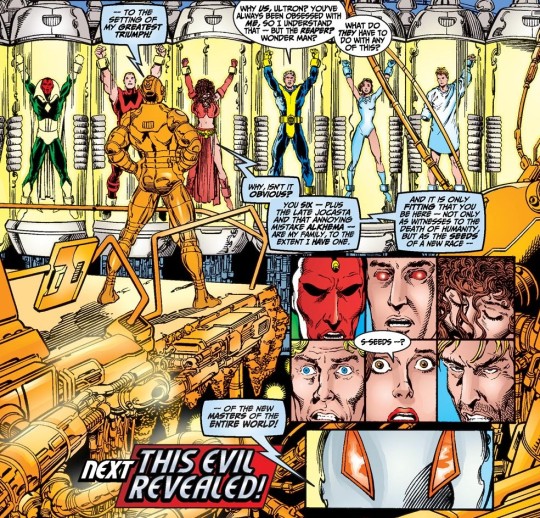
Ultron-16 still holds his "family" prisoner and talks about using Hank Pym's brain patterns to create his "children", which causes Pym to start having a mental breakdown. Ultron notices Black Panther and Firestar approaching and confronts them on his war platform as Firestar signals the other Avengers to their position.
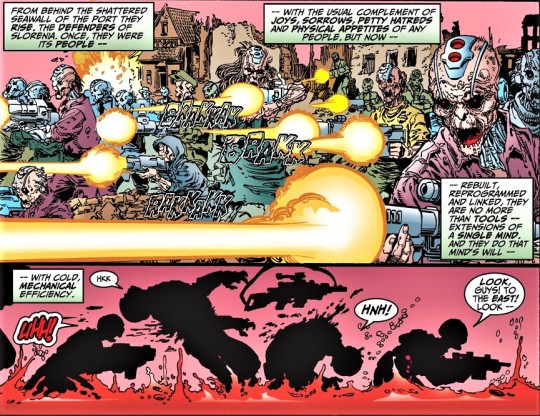
Back at the facility in Virginia, a group of robots take out security and free Alkhema while Justice researchers Ultron's past at the Avengers Mansion.
The Avengers launch attack after attack out Ultron and are unsuccessful until Captain America drives his photonic shield-turned-quarterstaff into Ultron's primary ion channel and Thor summons a powerful lightning strike that hits the same spot and destroys Ultron.

Heading into the tunnels beneath Slorenia, the Avengers encounter Ultron-17, then Ultron-23 followed by Ultron-458 before the ceiling and walls echo with the sounds of what seems like hundreds of Ultrons.
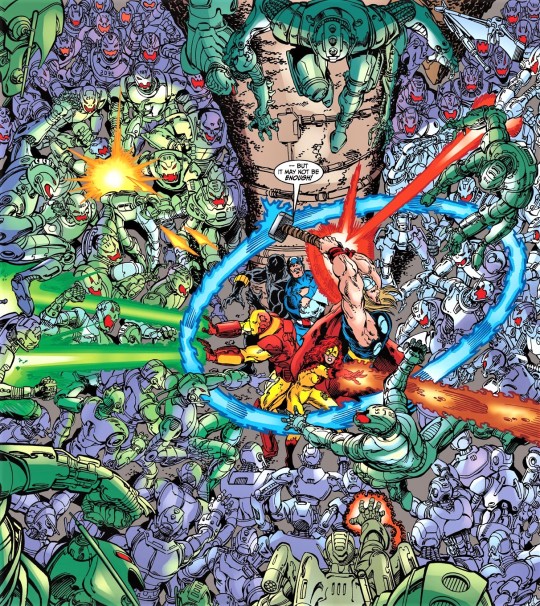
The Avengers battle on against the hordes of Ultrons, thankfully constructed of only titanium and secondary adamantium, while Ultron completes the brain engrams. The Vision frees himself and confronts Ultron. Their battle frees the other captive family members. The Avenger joins them after dispatching the Ultron horde. Unfortunately, their combined might is powerless against Ultron's pure adamantium body. However, Justice comes through for the team and delivers Antarctic Vibranium (known as the anti-metal) to Pym who apparently destroys Ultron.

REVIEW
One of (the many) reasons I didn’t like “Avengers: Age of Ultron”, was Ultron’s motivations for ending the human race. It’s like he already knew that robots have to kill humanity. Something similar happens here with Ultron’s motivations, I understand them, but they don’t make much sense. Does he really need to model all the robots after his “extended” family?
Avengers #0 is actually one of the first Avengers comics I ever had (they weren’t a very hot property in the nineties). But I never got the chance of reading the rest of the story until now.
In the end it even feels like this is all Hank Pym’s fault (as usual), and because of him Sokovia Slorenia has been destroyed and it’s citizens killed.
The art is really impressive. I can see Al Vey’s touch in those pages (some characters do not look like classic Perez). The result is a nice blend of old, iconic, with new and spectacular.
I give this story a score of 7
#george perez#stuart immonen#ultron#avengers#ultron unlimited#marvel comics#comics#review#1999#modern age#age of ultron#iron man#captain america#black panther#thor#firestar#justice#vision#scarlet witch#wonder man#hank pym#yellowjacket#ant-man#wasp
17 notes
·
View notes
Text
I saw Endgame on the Sunday after it was released in theaters during a work-related conference in Chicago. I bought advance tickets for a screening at the ShowPlace ICON at Roosevelt. The theater featured “industry leading customer service”, reserved stadium seating, the ICON-X enhanced xperience with Dolby Atmos, upwards of 60 individually powered QSC speakers and 40 QSC digital amplifiers, and a fancy lounge with fancy cocktails. The screens were nearly 1500 square feet.

My hotel (and the conference) were in Hyde Park, a gorgeous diverse neighborhood in the South Side of Chicago. As I explored the neighborhood, I stumbled by the Harper Theater, a local spot that had screened films for the local community since 1913 (with a break in the early aughts). It did not have stadium seating or an ICON-X enhanced xperience. I don’t know how large the screen was, but it was not nearly 1,500 square feet. The theater was screening Endgame but there were no lines or fuss, just some posters promoting the movie and people casually milling about the theater. There was something about the casual atmosphere and the friendly environment that felt appealing. I decided to return my ticket at the ShowPlace and buy one at Harper.
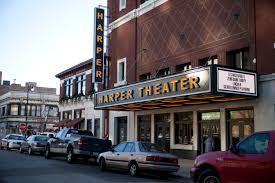
The theater didn’t serve much food but was near some great places that did (props to Ja’Grill Hyde Park). It also featured a ticket taker/usher/bartender who made a mean (and inexpensive!) Jack and Coke.The projection was perfectly fine and the sound was clear. The theater was full, but I got there a little early to get a good seat. The audience was perfect, engaged but not loud enough to be a distraction. It was a terrific viewing experience. As the credits rolled at the end of the film, surrounded by satisfied families and fans, I thought that Marvel had finally produced a legitimately great film that captured the experience of reading an epic superhero comic.
I had breakfast with a colleague at the conference the following morning. We chatted about work, family, Game of Thrones and Endgame while sipping coffee and absentmindedly picking at bagels. We both grew up on comics and were surprised at how excited we always were for the latest Marvel film, even when we had mixed feelings about the actual product. They chuckled as they told me that they took Friday off work to watch the film after closing out a particularly challenging case. I told them that I saw the film immediately after a networking dinner at the conference to wind down. They shared their mixed feelings about the film – they enjoyed moments and the spectacle, but the film was far too long and didn’t make much sense. I nodded thoughtfully. I shared my thoughts about the film. They asked me whether I liked the film. In that moment, I realized that I didn’t know.
Endgame is the second part of a story about the epic battle between almost every hero introduced in Marvel Studios’ Marvel Cinematic Universe (MCU) vast narrative (including the Avengers) and Thanos, a hypercompetent nearly omnipotent super villain with plans to reduce the population of the universe by half that began in the Infinity War. The film is partially inspired by Jim Starlin, George Perez and Ron Lim’s classic Infinity Gauntlet miniseries from the early ‘90’s. It features the surprising team ups, epic battles and astronomical stakes that one might find in a classic superhero event crossover. For those of us who read superhero comics when we were children (and many who continue to read the books), this pair of movies combine to form a single expensive, perfectly designed nostalgia machine.
The film blends melodrama, situational comedy, slapstick, space opera and action to create an entertaining viewing experience, but it also values emotional resonance and fan satisfaction over storytelling logic and meaningful stakes/consequences for character actions. The film alternates between dialogue and banter heavy scenes and pedestrian action scenes with state of the art visual effects in a way that feels thrilling in the theater but quickly fades from memory upon exit. Endgame tantalizes the audience with a world of imaginative possibility that feels absent of civilians or characters who are not superheroes (by this point in the narrative, the Avengers are mostly protecting and avenging one another).
Endgame exemplifies the strengths and shortcomings of the MCU project as a whole. It is a film that captures the sense of discovery and excitement that readers like me felt when reading superhero comics as children, appeals to a global audience of people who are only familiar with the Marvel characters as brands and feels somewhat weightless and insubstantial.
I saw the first MCU movies (the first ‘phase’) in the theater. The sense of awe I felt watching Iron Man on the big screen diminished with each film that followed. After Joss Whedon’s Avengers, I mostly saw MCU films on a streaming platform on nights when my wife went to sleep early. They were more densely plotted and serialized than procedural shows like Law & Order and not as intellectually taxing or emotionally draining as shows like the Americans. They scratched an itch. The best of these Marvel films were thoughtful and entertaining, but other than a few standouts – Captain America: Winter Soldier, Black Panther and Thor: Ragnarok – the scenes and images faded shortly after the credits rolled.
I never got completely used to this experience. I’ve loved superhero comics and film for most of my life, and one of the things they have in common are the images that lingered in my imagination.
The woman emerging from the sea as a god surrounded by flame. The man who realizes that he’s going to leave his wife and child and stay with a near stranger in France. The woman who embraces her rage and allows her exterior to reflect her interior. The door closing on a woman who allows herself to realize what she suspected all along – that she lost her husband to his family and their business a long time ago. The makeshift family who momentarily put aside their troubles to enjoy each others’ company, if only for a moment. A sequence that asks us to imagine a near future America that feels as uncertain and unsafe as the unstable countries we all read about in the newspaper (never mind that we were always more uncertain and unsafe than we thought and some of those places may have been more stable).
youtube
I will never completely understand how the marriage of superhero stories and film in the Marvel Studios films has produced so much entertaining work with so few memorable images and moments.
The excitement that I felt in Chicago’s Harper Theater surrounded by enthused families and dedicated Marvel fans faded into respect for the craft involved in creating the film as I walked back to my hotel room. It took me a few days to notice that Endgame’s plot (and the film’s overall role in the MCU vast narrative) left more of an impression than any image or visual sequence in the film. There were flashes – the exhaustion on Robert Downey Jr.’s face, the calm expression of Mark Ruffalo’s Hulk – but very little that lingered in the imagination.
As I sat through workshops and chatted with colleagues from peer institutions over the following days, I found myself returning to the storytelling choices of the filmmakers and Endgame‘s place within the larger MCU vast narrative. There were elements and ideas that were still fascinating, but others which had a distancing effect, a reminder that I was watching a commercial product.
2. Endgame: The Pedestrian Puzzlebox
Endgame is the last chapter of the most successful film franchise of the last decade, a visual effects extravaganza designed for theaters with top of the line sound and projection systems. It’s also one of the few action franchises that feel more driven by dialogue than compelling action scenes. The visual effects are state of the art but the action scenes are relatively pedestrian, lacking the brutal beauty or poetry that can be found in the John Wick or Raid franchises.
youtube
youtube
I didn’t have the sense of awe or magic that I get from watching films from the Star Wars franchise (which is even effective on a smaller screen). One of the things that separate great action films like the Police Story or Mission Impossible franchises from lesser films is the use of action sequences as a tool to add layers of meaning to the overall story. The fights aren’t just a way to get from point A to point B or an opportunity to thrill the audience, they help us understand the characters involved and gain insight into their respective journeys. We see combatants display their strengths and vulnerabilities and learn from mistakes. The scenes tell a story through movement that complements the scenes with dialogue.
youtube
Tony Stark’s sacrifice is foreshadowed in the dialogue-heavy scenes in Endgame and occurs at the close of the film’s biggest action sequence, but the opportunity to use the action and movement to tell the final part of his story was lost. His final battle with Thanos and his army did not look or feel meaningfully different from his prior conflicts with Thanos and other antagonists, except that the outcome was not the same. In an early scene, we do see what Thor learned from Infinity War (don’t pause when you’ve got a kill shot against a genocidal maniac), but it would have been interesting if Thor’s approach to combat in the final battle in Endgame was more clearly informed by the prior film. On first viewing, Thor’s ferocity in Endgame doesn’t feel much different than the ferocity that he displayed in the closing battle of Infinity War.
The action in Endgame may not have the beauty or meaning that one might find in the best action movies, but even after a decade, there is still something novel and exciting about engaging with a franchise that isn’t just composed of a number of smaller franchises with interlocking stories, but has incredibly fluid narrative boundaries. Each film in the Marvel Cinematic Universe (MCU) stands alone as an independent work or as part of an independent franchise, but could also be viewed as a piece of a larger story that shifts the audience expectations of narrative extent from the confines of a two-hour film to a ‘cinematic universe’ that includes nearly two dozen films and which represents the entire output of a film studio.
Some viewers can engage with the film as a part of a single vast epic narrative that begins with 2008’s Iron Man, but for others, this film is simply the last in a quartet, or most interestingly, as a part of a loosely connected string of films that have some familiar faces. There were some in my audience who were ardent fans of the MCU and others whose knowledge of Marvel consisted of vague memories of Iron Man and the first Avengers movie and crystal clear recollections of Black Panther (the crowd erupted when Wakandan warriors made their appearance in the final action scene) and Infinity War.
We can treat each film as a chapter of a story or a piece in a giant puzzle, but not only do we not need to experience all of them to understand the larger narrative, the shape of the story itself changes based on the number of Marvel films one has viewed. A story about heroic sacrifice can be one about the limits of duty or another one of a series of zany misadventures. It can even be a prelude to a story where your favorite franchise moves from the margins of the narrative to the center.
These qualities help make Endgame feel like the perfect Marvel Studios film, a work that can appeal to different slices of the audience who are engaged with one or more of the lucrative franchises within the larger MCU. It is interesting to think and talk about, but it’s hard to avoid the sense that the film is essentially a nostalgia machine filled with unremarkable images and scenes. Is this why it was so hard answering my colleague’s simple question?
Did I like this film at all? And if I didn’t, why am I still fascinated by Endgame?
Wrestling With Endgame 1 - Endgame at Hyde Park. The first of three posts on Avengers Endgame (spoilers lie within). I saw Endgame on the Sunday after it was released in theaters during a work-related conference in Chicago.
2 notes
·
View notes
Text
Earth’s Mightiest Retrospective Ep 21: “Hail, Hydra!”
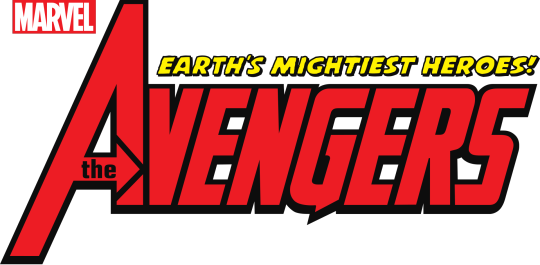
(Directed by Vinton Heuck, Written by Kevin Burke and Chris Wyatt, Original Airdate: May 22, 2011)
Season one’s finale storyline is rapidly approaching, so it’s time for Avengers: Earth’s Mightiest Heroes to do tie up a few loose threads. “Hail, Hydra!” begins that by operating as the culmination Hawkeye and Black Widow’s storyline and the Hydra/AIM dynamic. It starts with Natasha coming to the Avengers for help against the organizations. This is a direct follow-up from the events of “Widow’s Sting”, since the villainous organizations are about to war in New York City over the right to wield the Cosmic Cube. The Avengers justly doubt Widow’s claim that she came looking for their help after everything she’s done, so she finally comes clean to them. Nick Fury gave her the mission to infiltrate Hydra and everything she’s done this season, including framing Hawkeye, was a necessary move to remain undercover. Now she can’t contact SHIELD, since Fury was the only one who knew about her mission and he’s MIA, and she can’t let Baron Strucker get his hands on the Cube. If he manages to grab it once it’s at full power, he’ll re-write reality so that Hydra defeated the Allies in the 40s and conquered the world.
While the Avengers don’t trust Widow personally and some of them doubt something like the Cosmic Cube could exist, they can’t deny the city needs their help when they see the battle between Hydra and AIM begin. The heroes get to protecting as much of they city as they can while tracking down Strucker, MODOK, and the Cube. It quickly becomes a more complicated fight than other attacks on the city they’ve fought against. When the Cube’s energy causes Iron Man to crash land after he scans it, Wasp and he are confronted by the new Director of SHIELD, Maria Hill. She’s less tolerant of the Avengers’ constant intervention in these massive scale crises than Fury and demands the team stand down or face SHIELD.
Since the heroes she’s face to face with won’t stand idly by while the city’s in danger, the Avengers now need to worry about three organizations gunning for them. Iron Man and Wasp get into aerial chases with jetpack-wearing SHIELD operatives, since Hill has no intentions of backing down. The fight between the heroes and the agents continues, including some intervention from Thor and Black Panther, until a Hydra robot takes aim at the SHIELD Helicarrier. The Avengers intervening to save it.
Resolution on Hawkeye’s arc with Black Widow gets brought finality amidst the battles in the city streets. Early in the episode, he’s willing to trust her on at least the basis of her claims about what Hydra and AIM are about to do, but he’s otherwise right there with the rest of the team. Hawkeye and Widow’s story gets an outsider’s perspective added to as Ant-Man joins them to track down Strucker. Hank’s incredulous that Hawkeye could begin to trust the person that framed him, but Clint has a SHIELD agent’s perspective and understands. They encounter a Hydra ambush, revealing Strucker knew about Widow’s double agent dealings. It’s in that fight that Hawkeye and Black Widow talk about everything, get into the groove of fighting alongside each other again, and determine themselves to find where Strucker went.
The villain material for this episode consists of the respective heads of Hydra and AIM, Strucker and MODOK, coming face to face to fight over possession of the completed Cosmic Cube. MODOK’s part in the faceoff concerns how he uses his scientific prowess and mental capabilities to overcome the Hydra agents surrounding him. Strucker unveils his counter-measures for those, knocking MODOK out of the fight and making his move for the Cube. This encounter works as a final showdown between these two overarching threats throughout the season and displaying which one was the better villain between them in Strucker’s victory. There’s still a bit of goofiness to this portion of the episode, since we’re reminded that the last letter in this version of MODOK’s name stands for “Konquest” rather than “Killing.” It’s worth pointing out in relation to how EMH, unlike similar shows aimed at a young audience, doesn’t otherwise have a problem mentioning death and killing.
While Captain America’s not the primary Avenger being focused on this episode, it gives him plenty of chances to shine. When Cap and Hulk are fighting side-by-side in the streets, Steve gets to pull out a signature “Captain America Motivational Speech.” He lets Hulk know that he considers him a hero and friend, since the Green Goliath never stops helping people no matter how much he’s hunted. Later, the Avengers find Strucker, accomplished by Hawkeye launching Ant-Man with one of his arrows to keep the Baron from grabbing the Cube, the shifting tides of the fight in the warehouse quickly turn to another round for the Captain versus the Baron. It’s a good moment for Cap’s character in this series, as he fights through the fatigue brought on by Strucker’s ability to drain life energy. The atmosphere of the fight adds to the presentation of it, since the warehouse is burning in the background and everyone involved gets covered in a bit of a glow and some harsher shadows. The fight between the two old enemies ends as Captain America and Baron Strucker rush to grab the Cosmic Cube at the same time, only to find it apparently inert.
The end of the episode provides some closure for this season one storyline, as MODOK, Strucker and all their men are taken into custody by SHIELD. Even with the help the Avengers provided, Director Hill let’s them know she’s not over any of the problem she has with the team. She plans to appeal to the government for the Avengers to officially register as SHIELD agents, whether they want to or not. Hawkeye helps Black Widow escape from the SHIELD patrols in the city, but she doesn’t leave until after they share a kiss. “Hail, Hydra!” ends on the Avengers discussing how the entire evenings events seemed to be for nothing, with the Cube ending up a dud. However, they do ask Cap what he would’ve wished for as he touched it. He answers that he’s just happy to have taken down Hydra permanently and the Cube’s power didn’t end up in their grasp.
However, this denouement on the Hydra storyline of EMH season one ends on some setup for season two. We see a new version of the explosion that landed Steve in the arctic back in “Meet Captain America”, one where Bucky survived as well. Heavily implied to have been caused by Cap holding the Cube.
Overall, the conclusions “Hail, Hydra!” brings to the Hydra and Black Widow plotlines of the series is satisfactory. This hasn’t always been the thread I found most compelling in the show, but the conclusion properly builds on everything in the show that came from it.
Next time, the Avengers’ greatest boon in defeating Kang becomes the bane of their existence.
If you like what you’ve read here, please like/reblog or share elsewhere online, follow me on Twitter (@WC_WIT), and consider throwing some support my way at either Ko-Fi.com or Patreon.com at the extension “/witswriting”
#Avengers#Avengers: Earth's Mightiest Heroes#Earth's Mightiest Retrospective#Wit's Writing#TV Review#Marvel Comics#Marvel#superhero tv#superhero animation#animation#comics
8 notes
·
View notes
Text
Ninjago Season 9: Throne Room
Sometimes following your heart means losing your mind.
The doors swung open with a bang, and suddenly she was there.
The metal bars rattled as if the impact of the large doors colliding with the scorched walls had caused the whole room to quake. The prisoner jolted back into consciousness as if he had always been awake, not even acknowledging the dried blood on his suit and face. There was no friendly glitter in his dark eyes- the eyes that once held so much light- as he fixed them on the princess of Ninjago as she moved down the carpet towards the large throne that was once her father’s...before she had him killed of course.
Her white-blonde hair was like a halo around her head as it fluttered around her face and shoulders. The short carefully cut bangs danced above her menacing eyes. Unlike her guest, those dark pools glittered dangerously as she kept her gaze locked on the throne. The makeup on her forehead down to her cheeks can be only described as red warpaint even though it looked more like dried blood that instead of turning brown kept the horrible crimson shade. And her mouth that once was carefully painted rose red was left colorless, maybe even chapped, was curling upwards just a little to remind the two guards and her caged foe that she was the one in power and was very happy that she was.
The ninja watched as she slowly took her seat, her thin legs crossing elegantly even though they bore no robes. Instead, her dark warrior suit contrasted the bright red and gold altar like a spill of ink on the brightly colored royal silks the princess once was forced to wear. Now she sat proudly on the seat, her smile twisting into one of a true villain before speaking two words into the silent space.
“Leave us.”
The two guards, both Sons of Garmadon worshippers, hesitated before leaving their post. They briefly walked down the long stained carpet before shutting the doors. The prisoner’s heart pounded in beat with the bang.
The ninja master’s eyes tore themselves back to the throne. Like a magnet, his eyes seemed to lock right into hers, for she was already baring her eyes right at him.
“Lloyd Montgomery Garmadon.”
Lloyd dared not to say a word back but his chest tightened. As much as he had tried to burn the memories from his head, his heart ached for the time she had said his name with love. Now she spoke his name carefully and slowly, making sure every consonant was pronounced and vowel was emphasized just to hurt the ninja master more. How badly he wanted to shout back, how badly he wanted to correct her: saying that he was no longer a Garmadon when the monster that wore his father’s face reigned as emperor. He bit down on his tongue, and tried to look away.
“I have no idea where they died,” the Quiet One continued. “The building was so large, it could’ve been anywhere.” Her eyes sent daggers into Lloyd’s chest. “They never did find the bodies.”
Lloyd wished the Quiet One would live more up to her name.
“I’m referring to my parents of course,” she continued. “My real ones. The old emperor and empress are nothing to me.” She began to twirl her hair in her long fingers. “I did like the palace, really I did. So many rooms, so many secret passageways, enough space and time to plot my revenge.”
With a quick sweep of her leg, Harumi stood from her throne. Lloyd kept her gaze on her not because he wanted to but because his body didn't have the strength it needed to look away. She slid a smile on her face as she started to stalk down the steps of the altar like a panther approaching its prey.
“That’s what makes me different, you see, it’s what makes me your greatest villain. I had the time. I had the resources. I had the trickery. You didn’t know I existed until I got away.” Her words burned into Lloyd’s skin. He didn’t want to admit that she was right.
“The Serpentine, sure they had reasons for revenge, and Morro had them too yet even they became soft. The Nindroids were built to destroy you all but yet failed in the end. The Overlord had thousands of years to prepare and yet fell because he prepared without knowing Lloyd.” As she spoke his name with such venom she grasped the bars of the cage, her face only a few inches from his. “They didn’t know you. I knew you, I know you. I could predict your every move, every step you would take. It was as easy as playing a board game against myself. I broke you, I shattered your heart and crushed your soul- I did that! Admit it Lloyd- I am your arch nemesis - I am your worst nightmare- I am your greatest villain!”
Lloyd stayed silent, his dark lightless eyes staring back as if he had woken from a trance.
“ADMIT IT!!” Harumi screamed as she tried to shake the bars. Lloyd still sat silent.
Harumi’s lip curled up. “Say SOMETHING!”
The throne room faded into silence. Harumi had her breath held, waiting to spit back in Lloyd’s face when he finally admitted it- but he never did. Instead, the ninja sat up just enough so his head was at the same height as hers so he could look her dead in the eye.
“I don’t believe it.”
Harumi choked. Lloyd could see her mind racing inside her head as she searched for a response, but Lloyd kept speaking.
“You said that the greatest villain was the one who got away. So what am I?”
Her mind raced on. Her lips were slightly parted so that the edges of her teeth were barely seen before the blackness of her mouth. Her hand loosened some as it dawned on her what he was referring to.
“I got away. I escaped. I lived. Was that part of the plan?” Lloyd’s words were harsh, spoken carefully but yet with so much power.
Harumi recoiled her hand. Even though he couldn’t reveal it, a surge of joy shot through Lloyd. His suspicions- though terrifying- were correct.
“It shouldn’t be much to assume that Emperor Garmadon wants you to bring me to him. And it’s not much to assume in your part that he is going to kill me where I stand if you do.”
The glitter in her eyes went cold. Her lips tightened and the flush in her cheeks drained. The ninja knew the truth now, and he began to feel sick to his stomach.
“Why am I here?” Lloyd asked her. “Why am I hiding in a cage here while Emperor Garmadon waits? He probably doesn’t even know you are here-doesn’t he?”
He saw her flinch. Lloyd had just called her out for treason, but his accusations were not faulty.
“Tell me why, Harumi!” Now Lloyd crept closer to the bars. He grasped the cool metal as he bore into her eyes and repeated, “Tell me why-“
“Because I need you!”
Lloyd’s throat turned to lead. Two and a half weeks ago his heart would’ve fluttered uncontrollably and he would have not controlled the massive smile that would overcome his face. Now, he felt as if Zane had risen from the dead just to freeze all the fluids in Lloyd’s body.
Harumi looked crushed. Her eyes were still glittering but now it was glittering with tears. None had escaped her eyes yet as she cast them down to her hands, laying dejectedly on her knees. With a clang, Lloyd fell back down so that he slammed into the bars on the other side of the cage. When the princess spoke again, it was barely a whisper as if she was afraid of the words leaving her mouth.
“I didn’t want to believe it either,” she breathed, not even trying to make eye contact. “My plan was so thought out- it was infallible. I knew what I had to do and I was prepared for every choice-every move-every sacrifice. My ultimate goal had to be achieved and the ninja- especially you- had to pay.”
She shuddered a heavy breath that sounded more like a sob. The lead in Lloyd’s throat started to burn, a sensation he immediately feared.
She continued. “When I saw first saw you I had so much bottled hatred towards you that had manifested over many years. I wanted to hurt you so badly, but I had to act as an ally until we had escaped the Oni Temple. I had you all fooled. I had you fooled. And I.... I fooled myself.
“Too late I realized I was more of an ally to you. I was even more than a friend. You had feelings for me. My first thought should have been celebratory. I had fooled the Green Ninja into falling for me. It would have been something I would laugh over when I ruled with Emperor Garmadon. But... I was terrified. At first I didn’t know why I was so scared of my fear. Then it hit me.”
She stumbled on her words, making them inaudible. Simultaneously a tear shot down her cheek. The burning in Lloyd’s throat was throbbing now, and it had spread to his eyes.
She wiped her cheek. “I didn’t realize it then, but my ultimate goal had shifted. Raising Garmadon was still the end game in my mind but now there was something else. Something my... heart needed.
“It shouldn’t have been true. How could I have made such a mistake? You were Lloyd Garmadon, the Green Ninja that has barely saved Ninjago time after time and leaving pain and death in your wake.” Lloyd flinched at the harsh words, but now he knew it was true. That made the words hurt like knives in his stomach. “But when I faked my friendship with you, I recognized things about you the textbooks didn’t. Like your relationship with your father. Your unfaltering faith in your friends. Your curiosity about me. How much you truly cared. The way you smile when you are cocky-“
Her cheeks reddened a tad from embarrassment. Lloyd tried to swallow but it felt like he was drinking molten lava.
“It was stupid of me. You are the bad guy. I am the good guy. I shouldn’t....I can’t feel that way. But I...”
Her voiced was drained out by the silence. Suddenly Lloyd realized she was staring at him. He blinked hard and dropped his gaze. “If-“ Lloyd tried speaking but his voice screeched like metal being scraped. “If you did feel...that way...then...why? Why let them...die?!”
“You wouldn’t understand....” Harumi whispered back. “You had to be broken like I have to truly love me.”
Every burning question he had about Harumi was answered in that one response. It all made sense. Ever since he met the young princess just a few weeks ago he’d been slowly stripping away layer after layer, mask after mask. He thought the Quiet One was her true face but even that assumption was wrong. That was the first mask she had to wear to hide-
The scared little girl that had just lost her parents.
Lloyd sucked in a shaky breath. For almost two weeks now he had despised her, not only for resurrecting a monster of a father but for crushing his heart. But now, underneath all that hate was a tiny bit of guilt. This girl didn’t deserve the revengeful life she had put upon herself. She didn’t deserve the blood on her hands or the fear that comes with her name. She deserved to be happy, to be loved.
Lloyd wanted someone to love her. He wanted-
The words were out of his mouth before he realized he was thinking them. He felt his body stiffen just as Harumi did the same. She stifled a gasp and covered her mouth with her hand. For a second they stared wide eyed at each other. Then in a blink of an eye the keys to the cage were ripped from somewhere on Harumi’s body and the cage door was torn open with the force that could rip someone’s arm clean out of their socket.
Lloyd’s first thought was that this was finally the cage he would die in, but was immediately mistaken. Harumi threw herself on the ninja, not even caring about his injuries, and locked her mouth on his.
Every single muscle in Lloyd’s body went on high alert, ready to strike her down and escape. His ninja-mind instinctively plotted over a dozen ways he could trap her in the cage but yet he didn’t move an inch.
His heart was too strong.
*****************************************
The two guards jumped when the doors to the Throne Room shot open with a bang. They clutched their weapons at the ready, but relaxed when they saw a flurry of long white hair flutter past them. The Quiet One dashed down the hallway and vanished around the corner.
Exchanging a weird glance, they peered back into the large room where the trapped Green Ninja remained in his cage with his hands planted on the metal flooring and his dark eyes wide in panic. They could hear his gasping breath even from the doorway.
One of the guards prodded the other with his hand. “The Quiet One really got him, didn’t she?” he mumbled with a smirk. “The ninja looks terrified.”
“What do you think she did to him?” the other guard hissed with a smirk of his own, hiding his own terrified mind.
“By the look of his face, I bet she lied and said they finally found the four ninja’s bodies. And then tossed them in the ocean for the sharks to finish off.”
They nodded together with devious smiles. Glancing one last time down the hallway to where The Quiet One had vanished, they walked back in the Throne Room and regained their posts.
They never noticed how red Harumi’s face had been when she fled the room.
They had been right about Lloyd being terrified, but it wasn’t about a lie. It wasn’t even about Harumi.
He was more terrified of himself than he had ever been in his life.
165 notes
·
View notes
Text
The Best Films of 2018, Part V
We’re finally here. Thank you for reading. Or at least scrolling around to the movies that you care about.
GREAT MOVIES
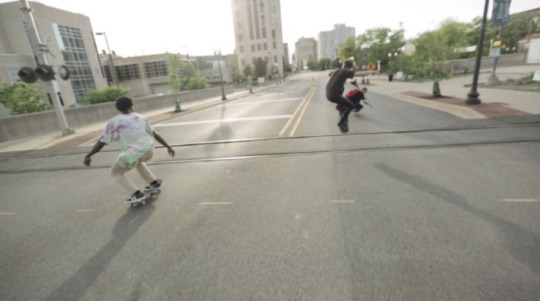
12. Minding the Gap (Bing Liu)- In part because it's produced by Steve James, Minding the Gap's easy short-hand is "Hoop Dreams for skateboarding." Because most of the film's pleasures come from following the subjects over the course of five or six years, that makes sense. What differs is that director Bing Liu is so young, which makes this a promising film if a less definitive one than James's feature debut. It’s trying to do so much, but it never feels calculated or constructed as it expands.
Boldly, Liu seems to suggest that people don't really change that much, that what drives them or gnaws at them just manifests itself in different ways. The cycle of abuse ends up being a common element for the three skaters, and, as Liu admits on camera, domestic violence is the reason he made the film. (The treatment of it is raw, a blunt object when a more delicate instrument might work better.) He got the hard part right though: delicately getting us to care about people who sometimes don't care about themselves.
11. A Quiet Place (John Kransinski)- Strong early Shyamalan vibes from this lean chiller. Krasinski's directing debut, Brief Interviews with Hideous Men, didn't do much for me, and I skipped his obligatory man-comes-back-to-hometown-because-his-mom's-dying follow-up. But the filmmaking really impressed me here just by understanding how to set the table of this kind of movie. A close-up on an important nail sticking out of a floorboard here, an effortless explanation of a rule there. The hang-up for a film this high-concept is that you get distracted by all of the unanswered questions. (How did he get a printer quiet enough to print out all of those radio call signals?) But this world is fleshed out enough, especially an eerie dinner sequence, to bypass that kind of stuff for me.
More than anything, there's a sort of elasticity of shot selection that serves the suspense. A tender early scene in which the central couple is dancing while wearing headphones goes on for maybe twice as long as one might expect. So later, the cross-cuts and smash-cuts have even more weight because the camera was allowed to linger earlier.
Here's maybe the biggest reason for the movie's success: The characters are all slightly smarter than the audience, whereas the temptation might have been to go the other way with it.
10. Black Panther (Ryan Coogler)- I don't know if I can add anything to the discourse on this meditative yet ambitious film. I do think one early scene points at what makes it special for the genre. When T'Challa is first named king, he has to be drained of the Black Panther powers to fight anyone who wishes to challenge the throne. A member of an outsider tribe challenges him and nearly beats him. It shows a) the world-building of this noble, fair culture, b) the existence of this fully developed clan that will be important later, c) just how human T'Challa is if his reign can come so perilously close to ending just as it has begun. Every scene like that has a logical purpose. Of course, once Killmonger, the best, most realistically motivated Marvel villain of all time, gets introduced, we return to that method of challenging the throne, and writers Ryan Coogler and Joe Robert Cole aren't afraid to let the worst possible thing happen to T'Challa. What occurred forty-five minutes earlier makes this fight seem like a fait accompli. And it's in this sort of narrative detail that the film is able to work up to its thematic purpose. The first half is about, to quote T'Chaka, whether a good man can be a good king. But the second half is about the responsibility of goodness. Show me where Iron Man bit off that much.
9. Support the Girls (Andrew Bujalski)- Although it takes place mostly in one location during one day, Support the Girls has a bigger world going on in its margins. We hear it on radios, or we see it in the people taking a pitstop in Double Whammies while they're on their way somewhere better. But the force that's really encroaching on the characters' insulated environment is Mancave, the national chain that threatens to put them out of business. "They have commercials and everything," one character complains, and we get snatches of those commercials that were presumably directed by Andrew Bujalski himself. It's ten seconds of content maybe, shot in a bigger, broader style than the modest approach of the rest of the film. But the key to understanding how far Bujalski has come is realizing that he is no longer making fun of the people in the commercial, even if they're jacked bros screaming for a boxing match. That portrayal is amplified, sure, but Bujalski is mature enough now to not ridicule those people. It's okay that they're just not the people he's interested in.
He's supernaturally empathetic toward the rogue's gallery of people he is interested in, who spin the ordinary challenges of the working class into something extraordinary. The sunniest member of the team is played by Haley Lu Richardson, who deserves special recognition as the indefatigable Maci. I can't think of parts that are much different from her roles in this, Columbus, and Split, to the extent that people probably don't realize they're played by the same woman, but she rules in every single one. The sky is the limit for her.
When a workplace is described as "a family," it's usually just a way for the boss to take advantage of workers when the "family" designation does nothing to help them: "I know I shouldn't ask you to work off the clock, but can you help me out as a FAMILY MEMBER?" Occasionally though, it does feel like a family when people work closely to one another for hours on end and depend upon one another for real life needs. This movie is about what happens when a work family is both control and support.
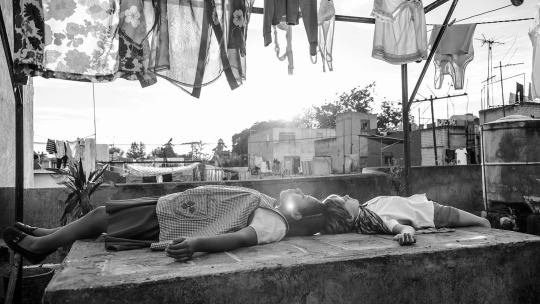
8. Roma (Alfonso Cuaron)- The trailer for Children of Men advertises itself as "from the director of The Prisoner of Azkaban and Y Tu Mama Tambien," and I remember an audience giggling at that strange CV. For one thing, at the time people didn't understand yet why someone would brag about contributing to a Harry Potter movie. But to pair that children's picture with either a Spanish title they hadn't heard of or a movie that they knew was sexually explicit? Who was this guy?
Roma is who he is. I like some of his other films more--I would argue that his approach hurts the performances here--but it seems impossible for him to make anything this personal again. The baldly emotional highs that it reaches come not only from the direct simplicity of the story but also from the sophisticated perspective with which it's being downloaded directly from Cuaron's memory. (It's also, accidentally or purposefully, quite a political film at this moment in time. It insists, sometimes in the dialect of Mixtec, that these people around us silently washing dishes or picking up dog poo are, in fact, part of our family.)
There's a moment when one brother throws something at another's head, barely missing, and they both stop in their tracks with fear about how tragically things could have ended up. My dad experienced a similar moment in his childhood, and he would tell the same story about Uncle Steve throwing a shoe at him any time we passed the wooden door with a dent in it at my grandma's house. What a tiny moment to live on for decades, in tangible and intangible ways. Cuaron claims that all of these moments shape us, and taking us to the moon was only a warm-up for resurrecting them for us.
7. Happy As Lazzaro (Alice Rohrbacher)- Alice Rohrwacher won the screenplay award at Cannes, probably because her script for Happy As Lazzaro is fundamentally unpredictable. Games of checkers are unpredictable though. That word doesn't quite cover the way the viewer is forced to guess at something as elemental as "What year is this taking place?" And none of the twists and turns of the storytelling--I refuse to spoil--would gel if Rohrwacher as a director wasn't teaching you how to watch the film the whole time with a rich, warm, light touch. Considering the purity of this vision as a fable, buoyed by realistic labor concerns on the other hand, it's a pity that people are calling Birdbox "crazy" when something like this is just a few clicks down on that service.
6. The Favourite (Yorgos Lanthimos)- When assessing The Favourite, the easy temptation is to say that because it isn't stuffy, because of its scabrous wit or its intimate filming techniques, that it "isn't your mother's chamber drama." It is invigorating, but in a lot of ways, the film isn't saying anything that the average Masterpiece Theater production doesn't. Instead it takes cultural touchstones about the emptiness of power and distorts them, much like the fish-eye lenses that Yorgos Lanthimos favors to photograph the palace. It says an easy thing in a hard way, with conviction to burn.
Lanthimos seems freed by not having to write the screenplay, and every decision of his is rooted in making things more narrow. The barrel distortion of the fish-eye seems apt for this idea, but so do the secret passageways that Queen Anne gets wheeled through to avoid the lower rungs of the estate. Of course there's no outside world to intrude upon her majesty. But there's even an inner world to the inner world. (It's impossible to watch Olivia Colman's gonzo depiction of Anne's incurious indolence and not think of Trump.)
I'm convinced that Emma Stone can do anything, and the final shot, an all-timer, only validates that suspicion.
5. Don’t Worry, He Won’t Get Far on Foot (Gus Van Sant)- You have to check out every Gus Van Sant movie, even after a few missteps, because you never know: He might take the emotional climax that you didn't even know you wanted and score it to inter-diegetic "Still Rock 'N Roll to Me," thus grounding real poignance with even realer goofiness.I'll admit that the bar is low, but this is probably the most authentic, least treacly movie ever made about addiction recovery. Van Sant, who wrote, directed, and edited, tells the story with patient command. We take Joaquin Phoenix for granted at this point, but everybody on the poster is exceptional. And Udo Kier gets to say, "Pop, pop. It's always about penises."
INSTANT CLASSICS
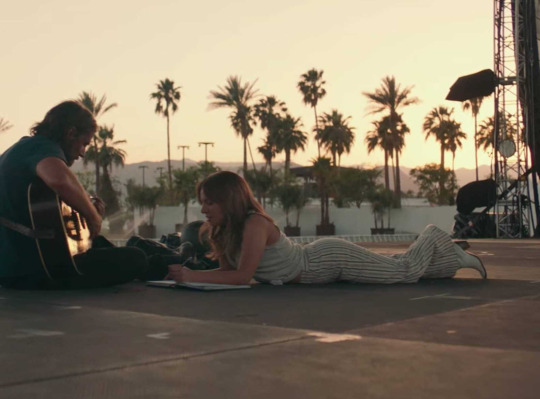
4. A Star Is Born (Bradley Cooper)- In one scene Cooper's Jackson Maine wears a black leather jacket under a brown leather vest, and the movie itself risks that kind of hat-on-a-hat silliness and redundancy. But instead it comes off as the best kind of big swing, a comforting and warm serving of Old Hollywood. Cooper's camera knows how to embrace silence and let the leads play off each other to craft raw, touching performances. Sometimes the close-ups are so intense and focused that, when he cuts back to a master, it's disorienting to be reminded that there are other people in that space, in the world at all.The movie's deficiencies come from "Wait, how much time has passed?" moments in the writing, problems that I always have had with Eric Roth projects. But it's easy to get swept up in a movie of moments that believes so much in itself.

3. Mission: Impossible- Fallout (Christopher McQuarrie)- The pattern of Mission: Impossible- Fallout is: infodump that explains the stakes and the strategy of what we're about to see, followed by an action sequence that is somehow even more thrilling than the one that came before it. Imagine a really interesting day of grade school classes, in which you learned, like, multiplication, followed by recess every other period. As for T.C., what more could you possibly want out of a human being?
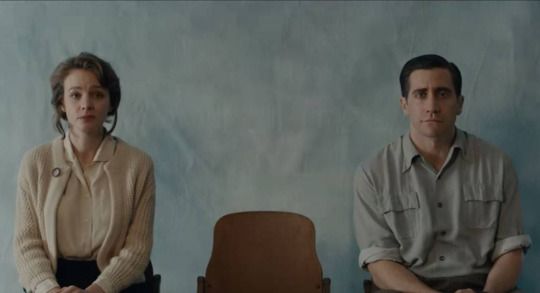
2. Wildlife (Paul Dano)- When Jerry, Jake Gyllenhaal's groundskeeper of pathetic pride, figures out that his boss is about to fire him in front of his son, he smiles and, through clenched teeth, asks if this talk can happen tomorrow. Part of him actually believes that postponing the meeting will help; maybe the boss's temper will cool overnight. But this is a man who is bound by the same desperate spirit as his wife Jeanette, who muses, "Tomorrow something will happen that will make us feel different." When people are living day-to-day, clinging to their dignity--he refers to himself as a "small person" at one point--tomorrow really does offer a regenerative power.
Those characters are the same-pole magnets that inform this coming-of-age tale, and the subtext of the film is "Can you believe Carey Mulligan and Jake Gyllenhaal have a fourteen-year-old son?" It works for the 1960 setting because these are people who defined themselves before they knew who they were, and they'll now do anything to re-define themselves as brave/sexy/valuable. But it works for the actors too. Gyllenhaal in particular is tender and heartbreaking in a true supporting role, allowing himself to look his age, framing himself with the dad akimbo arms. But Mulligan's fake confidence is great too, especially in a scene in which she nearly begs her husband to let her work. Something tells me that I should credit a director for coaxing two career best performances from two great actors. Some people just have it, and Paul Dano does.
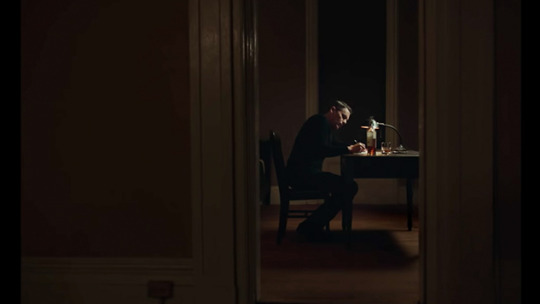
1. First Reformed (Paul Schrader)- In 1998 I dragged my father to see Paul Schrader's Affliction, a movie that was kind of about my father's father. When the end credits rolled on that bleak, wrenching film, my dad turned to me and said, "I feel like I have to take a shower." We walked around a nearby hotel and talked for an hour, not that he was able to articulate why he was so shaken. We discussed the difference between entertainment and art and what makes a piece of either successful. Even though he hated the experience, he couldn't deny that it was an experience. He kept on saying, "That's not why I go to the movies." And no matter what I, fifteen at the time, told him, he couldn't understand that's exactly why I go to the movies. First Reformed had the same mesmerizing effect as the best of Schrader's work: When I exited the building, I stumbled into the sunlight because I had been trapped in someone else's mind for almost two hours.
Part of that effect comes from the narrative device of Reverend Toller's journal, which plants us in his headspace from the beginning. Part of it comes from the intimate scale of the film, which features only a handful of locations. But if what I'm explaining seems small, then I'm doing a bad job. The canvas expands. Schrader insists that our care for the environment is our most immediate responsibility; this film historian has no problem with planting the film at 2017 in dialogue. And that emphasis is matched only by his disdain for how big business encroaches on personal aspects of our lives. There's even a scene that tries to account for a recent rise in extremism among young people. As if to prove that he isn't being pedantic, he has one character communicate one of those ideas, letting you assume that role is his mouthpiece, then he has another character reply with something just as convincing.
First Reformed weaves in those elements, but it's ultimately a character piece that humanizes the type of person we think we know but for which we have no frame of reference. In Ethan Hawke's piercing performance, we see a Reform minister who punishes himself actively and passively for what he thinks are sins. He uses faith as an armor and as an excuse, being so of the mind and--as another character puts it--"in the garden" that he denies himself medical care. No matter what anyone else tells him, he is convinced of one of the tenets that Schrader could never shake from his Calvinist upbringing: There's nothing you can do to save yourself.
2 notes
·
View notes